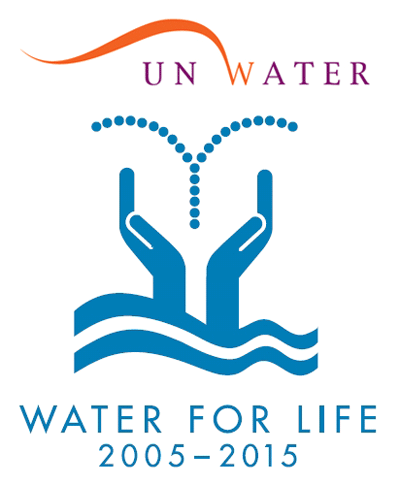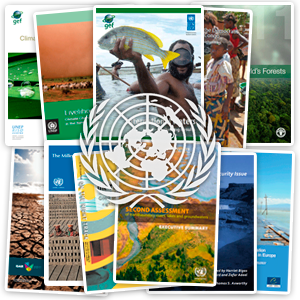- ON THE DECADE
- THE DECADE'S CAMPAIGN
- REPORTING ON PROGRESS
- THE DECADE'S PROGRAMMES
- FOCUS AREAS
-
- Access to sanitation
- Financing water
- Gender and water
- Human right to water
- Integrated Water Resources Management
- Transboundary waters
- Water and cities
- Water and energy
- Water and food security
- Water and sustainable development
- Water and the green economy
- Water cooperation
- Water quality
- Water scarcity
- FOCUS REGIONS
- RESOURCES FOR
- UN e-RESOURCES
News archives 2014 - 2015
Top water and sanitation projects awarded at UNHQ
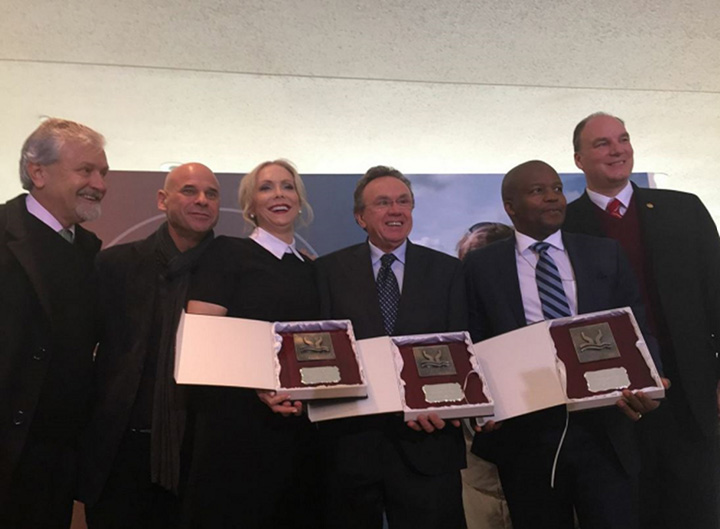
CAPTION: From left: Jorge Migeul Samek, Director General Itaipu Brazil; Guy Laliberte, founder of Cirque du Soleil; Catherine Bachand, CEO ONE DROP; Nelton Friedrich, Environment Director, Itaipu; Mahlatsi Mminele, Deputy Permanent Representative to the United Nations for South Africa; James Spalding, Director General Itaipu Paraguay
The winning projects were Cultivando Agua Boa for Best Water Management Practices (Category 1). ONE DROP Project India and DWS/WESSA Eco-Schools South Africa shared the award for Best Communications and Awareness Raising Projects (Category 2).
“It’s very important recognition for Itaipu,” said James Spalding, Director General of Itaipu Paraguay, of the Cultivando Agua Boa programme. “It’s an effort that started over 10 years ago, and it will continue over the next decades. For us this recognition will help us work closer with the communities and to move forward with promoting consciousness of the importance of clean and safe water.”
ONE DROP Project India – an NGO created by Cirque Du Soleil founder Guy Laliberte – was awarded for its innovative communications methods, including shooting a Bollywood film.
ONE DROP Chief Executive Catherine Bachand said: “For an organisation that is seven years old it is an immense privilege and a great honour to receive this award. For us this is about the message to the whole sector: that transformation is a profoundly human process, and perhaps not just about engineering. We need to build behaviour change if we are to build sustainable water access and sanitation projects.”
Deputy Permanent Representative to the United Nations for South Africa, Mahlatsi Mminele, who collected the award on behalf of DWS/WESSA, also spoke about the importance of recognition for upscaling water and sanitation projects.
>>See video news on the Award Ceremony.
New WHO/ UNICEF Report: WASH services in health care facilities
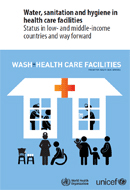
Water, sanitation, and hygiene (WASH) are essential to health service delivery and improving quality of care. A new World Health Organization and UNICEF report officially launched on 17 March 2015 presents the status of WASH in health care facilities in 54 low- and middle-income countries. Results show 38% of health care facilities lack an improved water source, 19% lack improved sanitation, and 35% lack soap for hand washing. Countries with a national plan for WASH in health care generally had higher coverage. Improving service levels requires health sector leadership, technical inputs from the WASH sector, and political commitment. WHO will work with UNICEF, Governments and other partners to develop a global plan to address the most pressing needs and ensure that all health care facilities have WASH services.
>> Access the report
>> More information
World Bank Group shares updates of the Thirsty Energy initiative
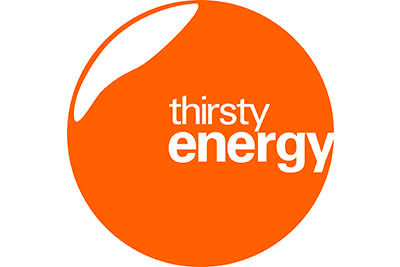
In order to help countries integrate water constraints into the energy sector and better address water and energy challenges, the World Bank launched the Thirsty Energy initiative on January 2014. The initiative aims to demonstrate the importance of combined energy and water management approaches through demand-based work in several countries. In order to share progress of the initiative, an update document presents the initiative’s communications materials, raising awareness events and promotion of dialogue between governments, international organizations and the private sector. A Private Sector Reference Group (PSRG) has been established to share experience and knowledge, to provide technical and policy advice, and to scale-up outreach efforts. The initiative also shares the implementation of their work at the country level, in South Africa, Morocco, and China, and preliminary discussions in Mexico and Brazil.
>> Read the Thirsty Energy update
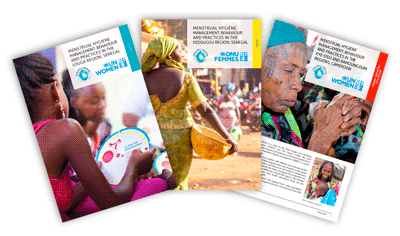
At an event hosted by the Permanent Missions of Singapore and Senegal to the United Nations on March 13, 2015, Government representatives, policymakers, researchers and development practitioners articulated the need to talk about a neglected area in women’s health and education- menstrual hygiene management. In this context, the Water Supply and Sanitation Collaborative Council (WSSCC) and UN Women revealed that women and girls in Central and West Africa lack access to clean water, private spaces for managing their menstruation, and clean, functioning toilet facilities. The organisations presented the series of studies on Menstrual Hygiene Management Behaviour and Practices developed within the Joint Programme on Gender, Hygiene and Sanitation in West and Central Africa. Amongst the key policy recommendations from the event is the call to Member states to break the silence around this issue, articulating menstrual needs in policies, budgets, programmes and monitoring systems and calling upon the global community to empower women and girls by guaranteeing safe menstrual hygiene management.
>> More information
>> WSSCC/UN Women Studies on Menstrual Hygiene Management Behaviour and Practices in Senegal, Niger and Cameroon

Both urbanization and climate change increase urban flood risk throughout the world. United Nations University Institute for the Advanced Study of Sustainability (UNU-IAS) and UNESCO-IHE Institute for Water Education co-organised the side event ’Integrated Water Cycle Management for Disaster Risk Reduction and Sustainability’ at the UN World Conference on Disaster Risk Reduction (WCDRR) in Sendai, Japan on 15 March 2015. This event explored sustainable approaches to urban water management for disaster reduction and amenity through water cycle stability. The event compared experiences from different countries to understand the balance between centralised and decentralised (on-site) measures and the importance of community participation. It also analysed how community participation varies depending on awareness levels, presentation, and the direct benefits received by the immediate community.
>> More information
ESCAP study on Natural Disasters in Asia and the Pacific 2014 calls for regional cooperation to address cross-border disasters
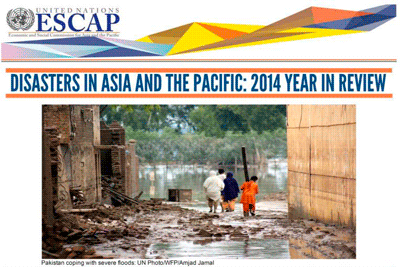
In 2014, over half of the world’s 226 natural disasters occurred in the Asia and Pacific region, affecting approximately 79.6 million people. The region experienced severe storms, cross-border floods and landslides, which accounted for 85% of all disasters, according to the ’Natural Disasters in Asia and the Pacific: 2014 Year in Review’ report, released by the United Nations Economic and Social Commission for Asia and the Pacific (ESCAP) on 24 February 2015. The report presents a diagnostic analysis of the region’s state of resilience and lessons learnt and highlights that the highest economic losses in Asia and the Pacific were incurred from river-basin floods (USD 16 billion). The region was found largely unprepared in its response to cross-border floods and landslides. Such disasters require improved regional information exchanges and the joint coordination of operations for effective early warning and evacuations, the report states.
>> More information
>> Download the report
UN Secretary-General launches 2015 Global Assessment Report on Disaster Risk Reduction

UN Secretary-General Ban Ki-moon warned that "growing global inequality, increasing exposure to natural hazards, rapid urbanization and the overconsumption of energy and natural resources threaten to drive risk to dangerous and unpredictable levels with systemic global impacts." The 2015 Global Assessment Report on Disaster Risk Reduction (GAR15), prepared by the UN Office for Disaster Risk Reduction (UNISDR) and launched on 4 March 2015 by the Secretary-General, states that economic losses from disasters are now reaching an average of USD 250 billion to USD 300 billion annually. GAR15 is a major contribution to the 3rd UN World Conference on Disaster Risk Reduction to be held from 14 to 18 March 2015 in Sendai, Japan, which is due to adopt a new global agreement on disaster risk reduction which will update the Hyogo Framework for Action. The agenda of the Conference includes a working session on Integrated Water Resource Management.
>> Read the full press release >> Access the 3rd UN World Conference on Disaster Risk Reduction website
>> Access the 3rd UN World Conference on Disaster Risk Reduction website
Launch of UN report ‘Putting Water and Energy at the Heart of Sustainable Development’
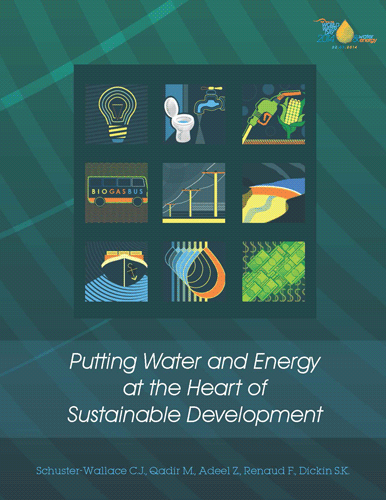
As independent sectors and through their inextricable linkages, water and energy are key drivers of economic growth and social development. Together, water and energy can promote stable societies and human dignity as well as realize basic human rights. However, significant advances are required in policy, research, and practice to realize the benefits of this nexus. The ’Another Drop’ Seminar organised by the United Nations University Institute for Water, Environment and Health (UNU-INWEH) on 10 March 2015 tackled ’Water & Energy for Societies, Equality & Sustainable Development’. The seminar featured the launch of the UN report ’Putting Water and Energy at the Heart of Sustainable Development’, a reception announcing a new partnership between UNU-INWEH and EPCOR, and a seminar presentation on the importance of meeting water and energy targets post-2015.
>> More information
New UN Report: Invest In Water to Prevent Conflict

The new report “Water in the World we Want”, prepared by the United Nations University Institute for Water, Environment and Health (UNU-INWEH) in association with the Global Water Partnership and Canada’s McMaster University, warns that without large new water-related investments many societies worldwide will soon confront rising conflicts over life’s most essential resource. Published in the run-up to the adoption this September of post-2015 Sustainable Development Goals (SDGs), the report provides an in-depth analysis of 10 countries to show how achieving water and sanitation-related SDGs offers a rapid, cost effective way to achieve sustainable development. Among top recommendations: Hold the agriculture sector (roughly 70% of world water supplies) and the energy sector (15%) accountable for making efficiencies while transitioning to clean energy including hydropower. The report underscores the need for clearly defined anti-corruption protocols enforced with harsh penalties.
>> More information
>> Download the report
DPI launches new website '2015: Time for Global Action'
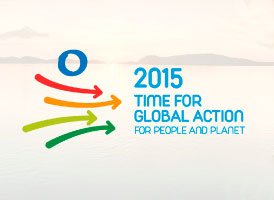
The Department of Public Information (DPI) launched "2015: Time for Global Action", the UN system-wide campaign that aims to build public support for the sustainable development agenda and show how the issues behind some of this year’s most important events are interconnected. As part of the campaign, a new website is now live and will shortly be available in all six official UN languages. This website will serve as a source of news, as a portal to UN system websites, and as the anchor for a robust social media campaign. It will also link to the extensive civil society mobilization under way through the concurrent Action 2015 campaign.
>> Access the website!
Just a few days left before the World celebrates a day for water and sustainable development!
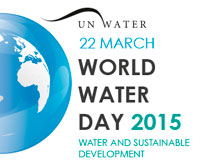
Date: 20 to 22 March 2014
Place: Worldwide and in New Delhi, India
On 22 December 1992, the United Nations General Assembly adopted the resolution A/RES/47/193 through which 22 March of each year was declared World Day for Water, as a day to make a difference for the members of the global population who suffer from water related issues and to prepare for how we manage water in the future. In 2015, the theme 'Water and Sustainable Development' encourages thinking around how water links to all areas we need to consider how to create the future we want. Water is at the core of sustainable development. Water resources, and the range of services they provide, underpin poverty reduction, economic growth and environmental sustainability. Each year, UN-Water provides resources to inspire celebrations for World Water Day. At the dedicated website you may find ideas how to celebrate World Water Day, material available for download and an events section to promote and search for events happening in different regions.
Although there are many events taking place all over the World, this year the main official UN event will be celebrated on 20 March 2015, in New Delhi, India. The United Nations World Water Development Report 2015 ’Water for a Sustainable World’ will be launched during the official celebrations. Other events organised by the UN include a joint World Water Day and International Women’s Day organised by UNESCO-IHE on 12 March 2015, the Water Lecture on ’Water and Sustainable Development: Positioning Water and Capacity Development in the Sustainable Development Goals’ organised by the UN-Water Decade Programme on Capacity Development (UNW-DPC) and other partners on 19 March 2015 and the reception on ’the Role of Water and Sanitation in Achieving the SDGs’
on ’Water and Sustainable Development: Positioning Water and Capacity Development in the Sustainable Development Goals’ organised by the UN-Water Decade Programme on Capacity Development (UNW-DPC) and other partners on 19 March 2015 and the reception on ’the Role of Water and Sanitation in Achieving the SDGs’ , co-organized by UN-Water, the Global Poverty Project, WaterAid and SIWI to take place in the United Nations Headquarters, New York on 24 March 2015.
, co-organized by UN-Water, the Global Poverty Project, WaterAid and SIWI to take place in the United Nations Headquarters, New York on 24 March 2015.
Watch the World Water Day trailer now online and use #WaterIs to share messages about #Water & #Sustainability!
>> Access the World Water Day website
>> Visit the World Water Development Report 2015 dedicated site
‘Water for Life Voices’ Exhibition in UN Headquarters to highlight progress during the Water Decade
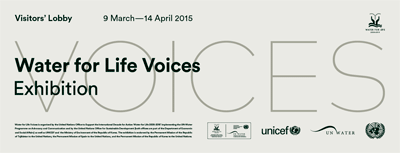
Date: 9 March to 14 April 2015
Place: UN Headquarters, New York, United States
Achieving the Water for Life Decade’s goals has needed sustained commitment, engagement, cooperation and investment from all. As the Decade is officially drawing to a close in 2015, the UN-Water Decade Programme on Advocacy and Communication (UNW-DPAC)wants to show how people’s efforts have contributed to its success. To this end, the Water for Life Voices campaign has gathered the voices of those whose life has changed over the last 10 years due to water and sanitation. Selected contributions from the campaign will form the exhibition at the UN Headquarters from 9 March to 14 April 2015. It is hoped that the exhibition will bring the voices of beneficiaries of water programmes over the Decade and highlight the human aspect of water programmes, and thus help support the inclusion of such considerations into the Sustainable Development Goals (SDG). As Josefina Maestu, Director of the Office to support the Water for Life Decade, explains: "This exhibit brings the lives and voices of the beneficiaries of water programmes right into the halls of the UN General Assembly. It serves as a reminder to the UN’s top decision makers of just how much impact their work has had on people over the last Decade. It should also show visitors how much has been done, and how much there is yet to do to ensure continued development and progress for all the world’s peoples."
>> Access the Water for Life Voices website!
>> More on the Water for Life Voices campaign
3rd UN World Conference on Disaster Risk Reduction
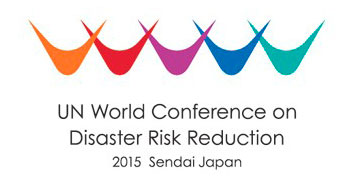
Date: 14-18 March
Place: Sendai, Japan
Organiser: United Nations Office for Disaster Risk Reduction (UNISDR)
The 3rd UN World Conference on Disaster Risk Reduction will be hosted by the Government of Japan and organized by the UN International Strategy for Disaster Reduction (UNISDR). Participants are expected to agree a post-2015 framework for disaster risk reduction (DRR). The United Nations General Assembly resolution adopted in 2013 on International Strategy for Disaster Reduction (68/211) states that the World Conference will result in a concise, focused, forward-looking, and action-oriented outcome document and will have the following objectives: (i) to complete assessment and review of the implementation of the Hyogo Framework for Action; (ii) to consider the experience gained through the regional and national strategies/institutions and plans for disaster risk reduction (DRR) and their recommendations as well as relevant regional agreements; (iii) to adopt a post-2015 framework for DRR;(iv) to identify modalities of cooperation based on commitments to implement a post-2015 framework for DRR; (v) to determine modalities to periodically review the implementation of a post-2015 framework for DRR. The 3rd UN World Conference on Disaster Risk Reduction and its preparatory process welcome the participation and contributions of all relevant stakeholders. The agenda includes a specific working session on Integrated Water Resource Management.
>> Learn more at the Conference’s website!
>> Access the UN resolution
>> More information on the Hyogo Framework for Action
Southeast Asia Water Footprint Training Course
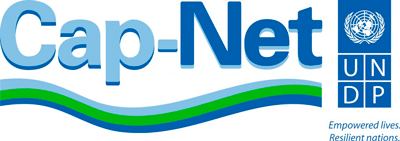
Since the United Nations Secretary-General's Advisory Board on Sanitation (UNSGAB) 2006 call for Water Operators’ Partnerships and the establishment in 2007 of the Global Water Operators’ Partnerships Alliance (GWOPA), regional and national Water Operators’ Partnerships platforms have been a key feature in the facilitation and promotion of Water Operators’ Partnerships worldwide. On 18 February 2015, the 1st dedicated workshop between the regional platforms and the GWOPA secretariat took place in Barcelona, Spain, with the purpose of getting a better understanding of the respective roles and activities of the platforms and GWOPA Secretariat and identifying concrete ways to support one another. The meeting took place in the framework of the 7th Annual International Steering Committee Meeting, from 19-20 February 2015.
>> More information on the GWOPA meeting and the 7th International Steering Committee meeting
ADB publishes Guidance Note on Irrigation Subsector Risk Assessment

This guidance note aims to explain key features of the irrigation subsector and identify entry points for mapping governance risks. It is part of a series of guidance notes for selected sectors and subsectors of the Asian Development Bank (ADB). The guidance note offers a framework for mapping governance risks to inform the preparation of future country partnership strategies, and supplements ADB’s Guidelines for Implementing the Second Governance and Anticorruption Action Plan. Section 2 highlights the significance of irrigation and its challenges. Section 3 presents a descriptive overview of the key features of the irrigation subsector, mainly for governance specialists involved in risk assessments who may not be familiar with this subsector. Section 4 outlines subsector risks that include priorities of public financial management, procurement, and combating corruption.
>> More information
Making the most of the Global Water Operators’ Partnerships Alliance (GWOPA)

UNESCO-IHP Malaysia in collaboration with UNESCO Jakarta, Water Footprint Network, Malaysian Water Partnership and Malaysian Capacity Development Network in Sustainable Water Management (MyCDNet), private organisations, lecturers and NGOs organised the Southeast Asia (SEA) Water Footprint Training Course from 24 to 26 February 2015 at Ampang, Malaysia. Participants previously trained in Pretoria, South Africa, under the Cap-Net UNDP funded initiative in 2013 were the facilitators for invited lead trainer Dr. Ashok Chapagain from the Water Footprint Network. A total of 47 participants took part in this course and had the opportunity to learn about water footprint assessment concepts and methodology; exchange knowledge and good practices in water footprint assessment approaches at the Malaysian level; and promote networking for capacity building in water footprint approaches in water management. Cap-Net selected participants for a video interview on the immediate impacts and their plans to apply the new knowledge back at their home country.
>> More information
Needle 2015: The Communication Conclave on Sanitation for India

NEEDLE 2015 is a collaboration between the World Bank Group and BBC Media Action to support the Government of India’s sanitation campaign. NEEDLE 2015 brings together practitioners, thinkers, researchers and innovators, in an effort to move the needle on stopping open defecation. Amongst the goals of Needle 2015 is to facilitate the establishment of a national multi-sectoral think tank on water, sanitation, and hygiene (WASH) communication that can provide guidance for the implementation of national, state, and district level WASH communication strategies. The collaboration also aims to shift the discourse from only building toilets to using toilets as well, and discuss the role of behavior change communication in bringing about the change.
>> Read more
Workshop on Water and Green Growth in Asia and Pacific
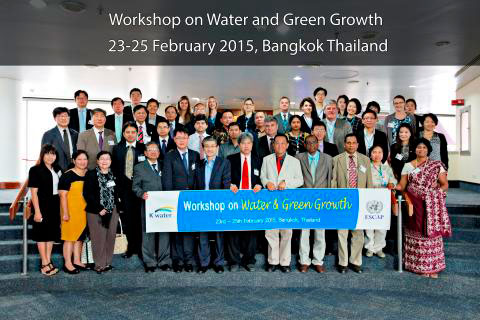
The United Nations Economic and Social Commission for Asia and the Pacific (ESCAP) in collaboration with K-water, Republic of Korea organised the Workshop on Water and Green Growth in Asia and the Pacific on 23-25 February 2015, at the United Nations Conference Centre in Bangkok, Thailand. The workshop promoted policy consultations for participants from member countries on applying green growth approaches in water resource management. This includes improved understanding for policy options necessary to integrate and synergize water resource management for sustainable economic growth. The outcomes of the workshop will be provided as inputs to the water and green growth thematic and regional processes of the 7th World Water Forum to be held from 12 to 17 April in the Republic of Korea.
>> More information
UNESCO-IHE signs partnership to develop water research capacity in Gaza and the West Bank
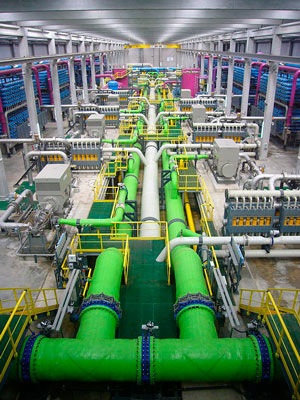
The Middle East Desalination Research Center (MEDRC) and the UNESCO-IHE Institute for Water Education have signed a partnership agreement that will see the two institutions further develop joint initiatives to assist the development of water research capacity. MEDRC and UNESCO-IHE have collaborated for many years in assisting research projects that focus on the water needs of Gaza and the West Bank. Both institutions have agreed to develop joint initiatives in the following areas: (i) joint proposal submissions for water research projects; (ii) development of joint events and conferences in areas of mutual strengths including desalination, water reuse and water, energy, food security nexus; (iii) knowledge exchange and sharing of best practices; (iv) joint initiatives to build research capacity; (v) initiatives to assisting individual Palestinian researchers.
>> More information
2nd season of UN Habitat’s ’Global Urban Lectures’ out now!
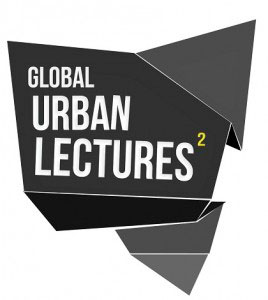
The urban lectures is a free resource of 15 min. video lectures, including synopsis, biographies and additional reading materials, open to use for academic, professional or personal purposes. Following the success of the first season, which to date has gathered over 25,400 views and is one of the most shared outreach initiatives of UN-Habitat, the 2nd season, launched on 9 February 2015, includes a lecture by Jane Weru, Executive Director of Akiba Mashinani Trust, on water and sanitation hygiene systems in informal settlements in Nairobi.
>> Full press release
>> Find the full series here
Strategies and Tools for Integrating Disaster Risk Reduction into Development Planning and Financing
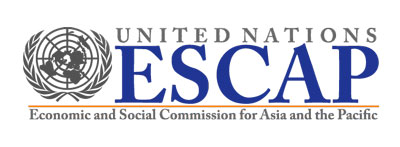
In the context of promoting multi-sectoral development planning to address disasters and mainstream disaster risk reduction and building resilience into broader development planning and poverty reduction strategies, the United Nations Economic and Social Commission for Asia and the Pacific (ESCAP) organised the Regional Conference on Strategies and Tools for Integrating Disaster Risk Reduction into Development Planning and Financing from 16 to 18 February 2015 at the United Nations Conference Center in Bangkok, Thailand. The conference outlined countries’ gaps and needs for mainstreaming disaster risk reduction and climate change adaptation into development planning and financing processes to be addressed under the project ’Enhancing knowledge and capacity for the management of disaster risks for a resilient future in Asia and the Pacific’.
>> More information
2nd global meeting of the Indigenous Peoples’ Forum at IFAD
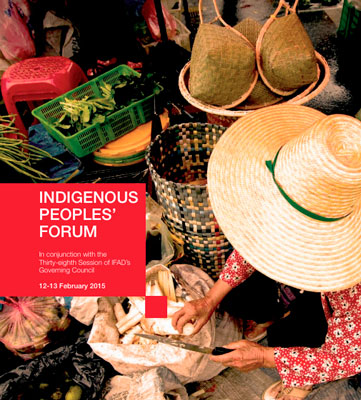
Indigenous peoples’ agricultural practices typically incorporate sustainable use of land and water resources, as well as various habitats and economic, social and cultural components. Fifty representatives of indigenous peoples' organizations from all over the world gathered on 12 and 13 February at the International Fund for Agriculture Development (IFAD) headquarters in Rome to discuss traditional food systems and sustainable rural development. Kanayo F. Nwanze, the President of IFAD, opened the forum together with Victoria Tauli-Corpuz, UN Special Rapporteur on the Rights of Indigenous Peoples. A unique initiative within the United Nations system, the Forum institutionalizes IFAD's consultation and dialogue with indigenous peoples' representatives at the national, regional and international levels. IFAD is the United Nations agency specialized in rural development, based in Rome - the UN’s food and agriculture hub.
>> Concept note
>> Agenda
>> More information
New UNESCO-IHE publication ‘Innovations for Water and Development’
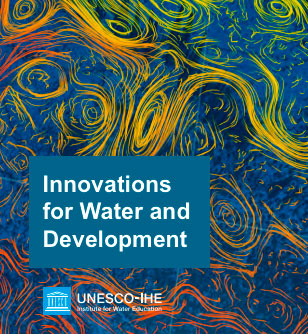
On 9 February 2015 the UNESCO Institute for Water Education published a booklet containing 50 innovative solutions in the field of water and development. The innovations were created with their global partnership network to develop, implement and validate novel solutions that ultimately aim to improve the quality of life on the planet. Innovations are often of a technological nature, but their adoption also has social, economic, environmental, governance, institutional and political dimensions. The research-based innovations originate from the six research themes of UNESCO-IHE that are aligned with relevant international and national science programmes. In addition, UNESCO-IHE has also developed a number of innovative products concerning education and capacity development.
>> More information and access to the publication
CBD publishes Press Briefs on Wetlands

On the occasion of World Wetlands Day (2 February), the Convention on Biological Diversity (CBD) published a series of press briefs focusing on the value of wetlands, as well as the role of wetlands in relation to: ecosystem services; meeting the challenges of the future; the Sustainable Development Goals (SDGs); and the Aichi Biodiversity Targets. The briefs point out that wetlands are some of the most important bio-diverse areas in the world and, inter alia, provide fresh water, and purify and filter harmful waste from water. According to the CBD, the proposed SDGs recognize the need to restore and manage water-related ecosystems, including wetlands, in order to address water scarcity and water risks, and wetlands are specifically mentioned in a number of SDG targets, including on: ensuring availability and sustainable management of water and sanitation for all (Goal 6);
>> Access the press briefs
>> More information on the Convention on Biological Diversity
UNESCO-IHE and World Resources Institute partner on Water Resources Management
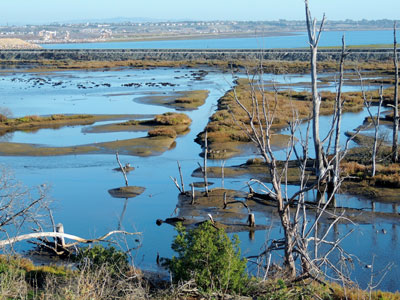
On 20 January 2015, the World Resources Institute (WRI) and UNESCO-IHE signed a Memorandum of Understanding on Water Resources Management for a duration of five years. Specifically, the partners will use their global networks to strengthen each other’s work, collaborate on linking the Aqueduct Monitor of WRI to UNESCO-IHE's Water Accounting System and explore the possibilities of developing new joint products. The Aqueduct monitor provides spatially explicit information on water stress (drought), flood and other types of risks based on a global model. The joint effort will build upon these water information products and further enhance global impact of either product.
>> More information
UN experts call for assistance to Malawi flooding

With less than 250 days to the target date for achieving the MDGs, the stock-taking meeting which took place from 19-21 January 2015 provided an opportunity for exchange of views on the inputs for the negotiations including the proposal on the Sustainable Development Goals (SDGs), the report of the Intergovernmental Committee of Experts on Sustainable Development Financing, the recommendations from the Structured Dialogues on a technology facilitation mechanism and the Secretary-General’s Synthesis Report. “We have a heavy but noble responsibility to finalize the new agenda on a strict timeline, so that our Heads of State and Government can adopt it during the forthcoming Summit scheduled for 25-27 September,” said UN General Assembly President Sam Kutesa as he opened the stocktaking session. In the meeting many member states reiterated the importance of a transparent and inclusive follow up and review framework for the delivery of the post-2015 development agenda.
>> Summary of Stocktaking session
>> More information
Groundwater Governance: High-level Expert Consultation Meeting

This High-level Expert Consultation Meeting on Groundwater Governance, hosted by UNESCO, took place on 3-4 February 2015. The invited experts contributed to the preparation of the final products of the Groundwater Governance Project: (i) the Global Diagnostic on Groundwater Governance; (ii) the Shared Vision on Groundwater Governance, and (iii) the Global Framework for Action on Groundwater Governance.The project Groundwater Governance: A Global Framework for Action is financed by the Global Environment Facility (GEF) and jointly executed by UNESCO’s International Hydrological Programme (IHP), the Food and Agricultural Organization of the United Nations (FAO), the International Association of Hydrogeologists (IAH) and the World Bank. The project's goal is to highlight the urgent need for improved governance of groundwater resources and to identify and promote globally valid principles for the governance of these resources at different levels.
>> More information
>> Visit the Groundwater Governance website
Intergovernmental Negotiations on Post-2015 Development Agenda: Declaration Session

Date: 17-20 February 2015
Place: New York City, US
Organiser: Office of UNGA President
The intergovernmental negotiations on post-2015 development agenda will take place over several sessions starting in January 2015. After the first stocktaking session which took place from 19-21 January 2015, this second session will take place on 17-20 February 2015, and focus on the Declaration. Co-Facilitators of the post-2015 process, HE Ambassador Macharia Kamau (Kenya) and HE Ambassador David Donoghue (Ireland), will convene an interactive dialogue with Major Groups and other stakeholders to comment on the draft elements for the Declaration on the post-2015 development agenda as well as to react to the interventions made by Member States during the preceding days. The 16-member February Stakeholder Steering Committee has now selected for this process 21 speakers representing the Major Groups and other stakeholders, ensuring regional, constituency and gender balance while also bringing a diversity of voices and expertise to the process. Side events organized by Member States, major groups and other stakeholders, UN system and other intergovernmental organizations, will also be held during this session.
>> More information
>> Side Events Preliminary Programme
>> Follow it live through UN Webcast!
Post-2015 intergovernmental negotiations: Stocktaking session

With less than 250 days to the target date for achieving the MDGs, the stock-taking meeting which took place from 19-21 January 2015 provided an opportunity for exchange of views on the inputs for the negotiations including the proposal on the Sustainable Development Goals (SDGs), the report of the Intergovernmental Committee of Experts on Sustainable Development Financing, the recommendations from the Structured Dialogues on a technology facilitation mechanism and the Secretary-General’s Synthesis Report. “We have a heavy but noble responsibility to finalize the new agenda on a strict timeline, so that our Heads of State and Government can adopt it during the forthcoming Summit scheduled for 25-27 September,” said UN General Assembly President Sam Kutesa as he opened the stocktaking session. In the meeting many member states reiterated the importance of a transparent and inclusive follow up and review framework for the delivery of the post-2015 development agenda.
>> Summary of Stocktaking session
>> More information
WWAP develops video-itinerary on water resources ‘The Water Rooms’

"The Water Rooms" is an outreach project led by the United Nations World Water Assessment Programme (WWAP) to be presented at EXPO 2015 - the Universal Exposition - and consists of a video-itinerary of five sequential "rooms" that will trigger interest and encourage learning about water resources and their sustainable management. Each room aims at offering a fun and emotional experience inviting the viewer to reflect on the dynamics affecting the resource and the actors managing it. From 21 to 23 January 2015 WWAP organised a brainstorming and writing exercise to create the storylines for each Water Room, and brought together scientists and technical experts on one side and creatives, filmmakers and writers, on the other.
>> Project Background and Meeting Agenda
New AquaCulture, Environment & Society Erasmus + Joint Master Degree Programme
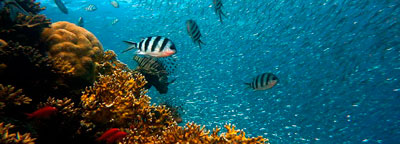
The United Nations University Institute for Water, Environment and Health (UNU-INWEH) announces that applications are now being accepted for the new Erasmus+ Joint Master Degree in AquaCulture, Environment, and Society that will start in September 2015 with the Scottish Association of Marine Sciences (SAMS), of which UNU-INWEH is a partner. Over 10 full Erasmus + Scholarships will be awarded each year to the top applicants. These scholarships will cover tuition fees, living, and travel expenses. Deadline for applications is 20 February 2015.
>> Learn more about the Programme
UN-Water unveils 2015 World Water Day website
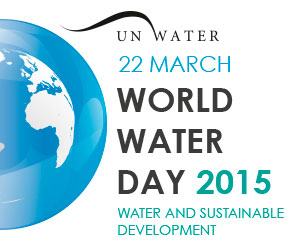
With less than two months to go to World Water Day (22 March) many organisations and groups are already preparing events and activities. The official World Water Day celebrations this year will be held in New Delhi, India, on Friday 20 March. This will also be the occasion to launch the World Water Development Report 2015 'Water for a Sustainable World'. This year’s theme, 'Water and Sustainable Development', encourages thinking around how water links to all areas we need to consider to create the future we want. Water is fundamental to the three dimensions of sustainable development, including social needs, economic development and environmental limits, and a cross-cutting driver. Moving from a sectoral approach towards a holistic one, which captures interconnections between food, energy, health, trade, the environment and water is necessary. Each year, UN-Water provides resources to inspire celebrations for World Water Day and has just launched the 2015 World Water Day website. The website takes the visitor on a journey to learn about water and sustainable development through short informative texts and visuals before proposing ideas how to celebrate World Water Day or learn more. There is also material available for download and an events section where organisations and groups can promote and search for events happening in their regions. Share your activities, ideas, films, learning material and resources! World Water Day is marked on 22 March every year. It’s a day to make a difference for the members of the global population who suffer from water related issues and to prepare for how we manage water in the future. In 1993, the United Nations General Assembly designated 22 March as the first World Water Day. Twenty-two years later, World Water Day is celebrated around the world shining the spotlight on a different issue every year.
>> More information
>> Access the 2015 World Water day website
UN-Water Report Calls for Wastewater Focus in Post-2015 Agenda
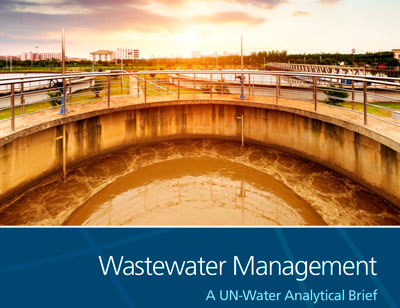
Only 20 percent of global wastewater is currently being treated, leaving low-income countries hardest hit by contaminated water supplies and disease, according to the UN report which encourages governments to see treated wastewater as a valuable resource, and a priority for the post-2015 development agenda. This is accompanied by the realization that the focus on drinking-water and sanitation without due attention being paid to wastewater may have exacerbated some of the water quality problems seen globally. It is increasingly being recognized that the issues of wastewater management and water quality have cross-linkages with a range of other water- and non-water issues, not least in respect of the water, energy and food nexus. It has also been acknowledged that wastewater management clearly plays a role in achieving future water security in a world where water stress will increase. Against this backdrop, there is an emerging consensus on the need for a dedicated water goal in the post-2015 Development Agenda, one which includes explicit recognition of the importance of good wastewater management and its contribution to protecting water quality. The report ’Wastewater Management- A UN-Water Analytical Brief’ looks at some of the problems caused by the neglect of wastewater management, but also at the benefits and opportunities that can be realized through proper attention to this area, and highlights why it is crucial that wastewater management and water quality stop being the ’poor relations’ and receive attention in their own right.
>> More information
>> Access the Analytical Brief
GSF experts share best practices to end open defecation
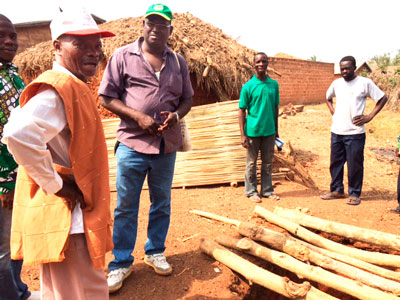
Sanitation professionals from the Global Sanitation Fund (GSF) programmes in Benin and Madagascar joined their GSF counterparts in Togo in a workshop held mid-January in the capital, Lomé. Around 70 participants, including EU and Togolese government delegates pooled collective experience in promoting improved sanitation and gained a better understanding of the context, aims and intervention of the Global Sanitation Fund. The workshop focused on strategies for implementation of community-led total sanitation (CLTS) and exchanged on how best to harness behavior change communications to stimulate communities to end open defecation by building latrines. The GSF-supported programme in Togo is managed by UNICEF for an initial three years, working together with the Hygiene and Sanitation Department of the Ministry of Health.
>> Full news release
>> Learn more about the Global Sanitation Fund in Togo
Groundwater Webinar reviews lessons and looks into key topics for 2015

On 15 January 2015, the International Groundwater Resources Assessment Centre (IGRAC) and UNESCO International Hydrological Programme (UNESCO-IHP) organized the LEARN Groundwater Webinar entitled: "Moving with the Momentum: Reviewing Lessons for Groundwater from 2014 and a Looking Ahead to 2015". During this webinar, experts from various organizations shared their views and experiences regarding three groundwater-related topics, namely: Sustainable Development Goals and Groundwater, Developments in International Law Applicable to Groundwater, and Assessing Transboundary Aquifers. The presentations are now available online.
>> More information
UNECE Ideas for Change Award: Innovation for Sustainable Development Goals

2015, the year of the 70th anniversary of the UN, is key milestone for the world. UN Member States will adopt an ambitious and action-oriented post-2015 development agenda with Sustainable Development Goals, in New York in September. At the same time, there is a "startup revolution" going on, producing most of the innovation with an impact on our daily life, and changing the way we do business. The United Nations Economic Commission for Europe (UNECE) wants to bring such powerful engine of transformation into the work for sustainable development and the green economy to improve people’s wellbeing. On 14 April 2015, UNECE will host the first ever startups’ event at the Palais des Nations in Geneva. The event will show-case how innovative entrepreneurial talent can contribute to address today’s social and environmental challenges, through new groundbreaking ideas that can become successful business. It will take place in the context of the 2015 UNECE session in Geneva (14-16 April), a high-level inter-governmental gathering where delegates of 56 Member States will commit to actions to advance the sustainable development agenda in the region in the years to come. The deadline for the call for ideas is 28 February 2015! UNECE is looking for innovative ideas and new solutions for sustainable development in a wide range of directly related fields, which may include water and sanitation. They are interested not only in products and technologies but also in social innovation and new ways of doing things!
>> Learn more and participate!
New Guidance for Companies to Respect Human Rights to Water and Sanitation
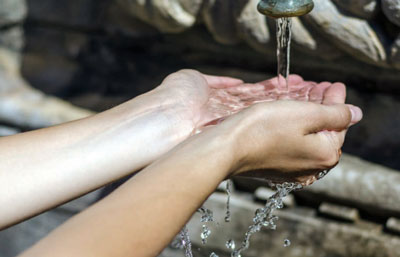
The first comprehensive guidance for companies about how to meet their responsibility to respect the human rights to water and sanitation was launched on 16 January 2015 by the United Nations Global Compact’s CEO Water Mandate at UN-Water’s 2015 Annual International Zaragoza Conference on ‘Water and Sustainable Development: From Vision to Action’. The beta version of the ‘Guidance for Companies on Respecting the Human Rights to Water and Sanitation: Bringing a Human Rights Lens to Corporate Water Stewardship’ aims at helping companies translate their responsibility to respect the human rights to water and sanitation into their existing water management policies, practices, and company cultures. “Ensuring people have access to water and sanitation services is vital to ensure healthy communities and vibrant economies,” affirmed Gavin Power, Deputy Director of the UN Global Compact and Head of the CEO Water Mandate.
>> Access the beta version of the publication
WWAP UNESCO Project for Gender Sensitive Water Monitoring Assessment and Reporting finalizing 1st phase
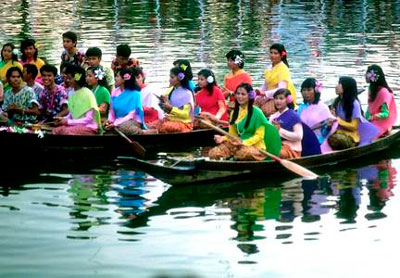
The UN World Water Assessment Programme (WWAP) has launched a groundbreaking project to develop and test the collection of key gender-disaggregated water data. The project will develop through 4 phases, with the help of international experts in the Working Group. The second workshop of the project took place in December 2014 with the aim of finalising the WWAP toolkit of the Gender Sensitive Water Assessment and Reporting project, with the production of a guideline-manual to be used by practitioners in various regions and a questionnaire to be used in field assessments. In February the WWAP will conclude the first phase of the project and will start working on the second phase, during which the pilot-testing of the toolkit will be implemented.
>> Learn more about the UN WWAP UNESCO Project for Gender Sensitive Water Monitoring Assessment and Reporting
UN General Assembly adopts resolution on International Decade for Action ‘Water for Life’ 2005-2015
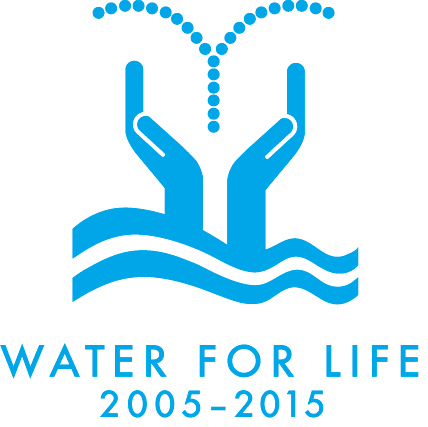
On 5 December 2014, at its 69th session, the UN General Assembly (GA) approved a resolution on the International Decade for Action ’Water for Life’ 2005-2015 and further efforts to achieve the sustainable development of water resources. The resolution welcomes the activities related to water undertaken during the International Decade for Action and encourages Member States, the United Nations system and major groups to accelerate their efforts to achieve the internationally agreed water-related goals. Moreover, the resolution invites the President of the GA to convene following World Water Day on 22 March 2015 a high-level interactive dialogue of the GA in New York on a comprehensive review of the progress achieved in the implementation of the Decade, including best practices and lessons learnt. The resolution equally welcomes the offer of the Government of Tajikistan to host and fund, in June 2015, a high-level international conference on the implementation of the Decade. Finally, it requests the Secretary-General report to the General Assembly at its 71st session on the implementation of this resolution elaborating, inter alia, on the evaluation of the Decade.
>> Access the UN resolution
Menstrual Hygiene Management in WASH in Schools: outcomes
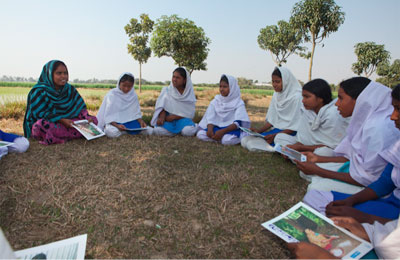
On 29 October 2014, UNICEF and Columbia University held the 3rd Annual Menstrual Hygiene Management in WASH in Schools Virtual Conference. As a follow-up to this conference, the partners held a strategy session and drafted a set of five priorities for menstrual hygiene management (MHM) in schools over the next ten years, including global guidelines, building a strong evidence base for MHM in schools, an evidence-based advocacy platform, getting national governments involved in responsibility for MHM in schools, and systematic integration of MHM in the educational sector.
>> More information
>> More about UNICEF and WASH in schools
UN launches 2015 International Year of Soils
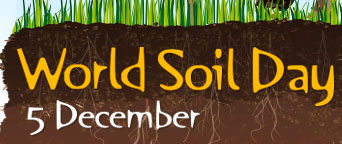
5 December 2014 was the first official celebration of World Soil Day and the launch of the International Year of Soils, declared by the 68th UN General Assembly (A/RES/68/232) to raise awareness of the importance of soils for food security and essential eco-system functions. Soil, together with water, is the basis for food, feed, fuel and fibre production and for services to ecosystems and human well-being. The achievement of food security and nutrition, climate change adaptation and mitigation and overall sustainable development greatly depends on the condition of soils at local and global levels. Soil also plays a key role in the supply of clean water and resilience to floods and droughts. On 1st World Soil Day UN Secretary General welcomed the establishment of the Global Soil Partnership by the Food and Agriculture Organization (FAO) and pledged "to do more to protect this important yet forgotten resource".
>> UN Press release
>> Message from UN Secretary General
>> More on World Soil Day 2014
>> More on International Year of Soils 2015
Impact of Inadequate Access to Water, Sanitation and Hygiene (WASH) facilities on women and girls
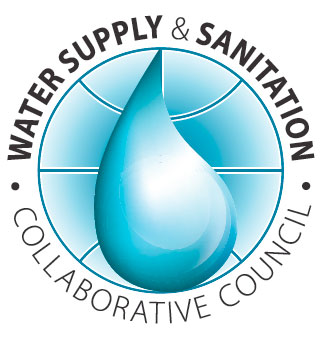
The SHARE Research Consortium and the Water Supply and Sanitation Collaborative Council (WSSCC) formed a research partnership in 2013 to investigate the specific impact of inadequate access to water, sanitation and hygiene (WASH) facilities on women and girls in India and Bangladesh. This partnership supports four studies which converge on the lack of safe and acceptable choices for women and girls. The studies raise links between unsafe sanitation and women and girls’ poor health in terms of stress and infections. The higher incidence of reproductive tract infections linked to poor menstrual hygiene management under socioeconomically deprived groups is equally highlighted. The research also points out the lack of WASH facilities accessible by pregnant women.
>> Access the research briefing notes
2015 UN-Water International Zaragoza Conference concludes moving #From Vision to Action with analysis of water-related SDGs and the role of the different stakeholders for their implementation
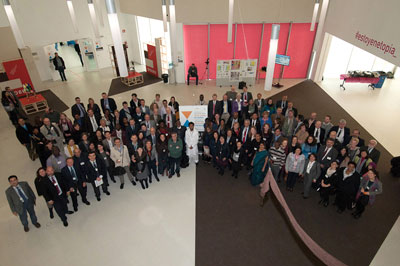
"2015 is an important year. An important year for disaster risk reduction, an important year for climate and an important year for water," said the UN-Water Chair, Michel Jarraud in his welcome video message to the 300 participants at the UN-Water International Conference. The Conference, which took place from 15 to 17 January in Zaragoza, Spain, was organised by the United Nations Office to Support the International Decade for Action ’Water for Life’ 2005-2015 implementing the UN-Water Decade Programme on Advocacy and Communication (UNW-DPAC), in collaboration with 18 UN-Water members, 13 partners and 21 other collaborating organizations and Governments. Participants included the UN-Water Vice-Chair, the Vice President of the Global Compact, delegates from 18 water programmes from the UN, the United Nations Special Rapporteur on the Human Right to Water and Sanitation, and the Coordinator of the UN-Water Working Group on Water related Sustainable Development Goals.
Exchanges, inputs, conclusions and some important questions were delivered through presentations from experts with varied backgrounds and experience. The conference took an inclusive media approach with coverage through a live webcast, reported through twitter feeds and daily summaries. Conference outputs, including a compilation of case studies, a ToolBox with numerous tools developed by the different UN entities, and information briefs providing a background on some of the issues discussed, are now available at the Conference website, to help us prepare for World Water Day 2015, which will focus on "water and sustainable development".
>> Video recording of sessions
>> Daily summaries
>> Information briefs
>> Cases
>> Conference website
15-17 January 2015: UN-Water Annual International Zaragoza Conference. Water and Sustainable Development: From Vision to Action!
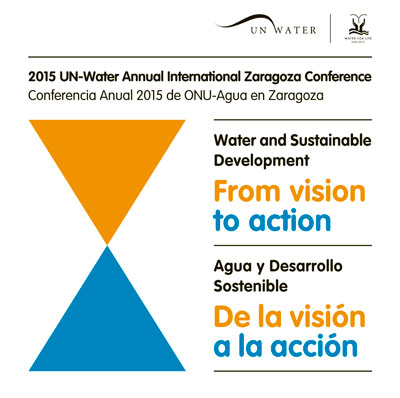
The post-2015 international agenda for water will be decided now. The UN-Water International Zaragoza Conference focuses on bringing the post-2015 agenda into action. This is a practical event on tools for implementation (financing, technology, capacity development) and governance frameworks, for initiating the post-2015 agenda for water and sanitation.
More than 300 participants from United Nations Agencies and programmes, experts, representatives of the business community, governmental and non-governmental organizations will meet from 15 to 17 January in Zaragoza, Spain, to draw conclusions based on existing practice and the exchange of views between governments and stakeholders. This is also the last year of the International Decade for Action ‘Water for Life’ so it is especially important for taking stock of and learning from achievements as well as planning the next steps.
The UN-Water Annual Zaragoza Conferences serve UN-Water to prepare for World Water Day. This conference is part of the road map for World Water Day 2015, which will focus on ‘water and sustainable development’.
Get involved and watch the conference live through the Conference website!
SDSN proposes 100 SDG Indicators and Indicator Framework
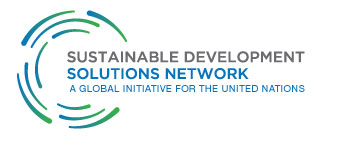
The UN Sustainable Development Solutions Network (SDSN) published an update to its report on indicators for the post-2015 development agenda, including a proposed set of 100 indicators. Titled 'Indicators and a monitoring framework for Sustainable Development Goals: Launching a data revolution for the SDGs,' the report builds on the proposals of the UN's Open Working Group on SDGs and the conclusion of the UN Secretary-General's Independent Expert Advisory Group on a Data Revolution for Sustainable Development, among other inputs, to suggest a framework for indicators for future development goals.
>> More information
>> Access the draft report
IGRAC publishes Transboundary Aquifer Cooperation report
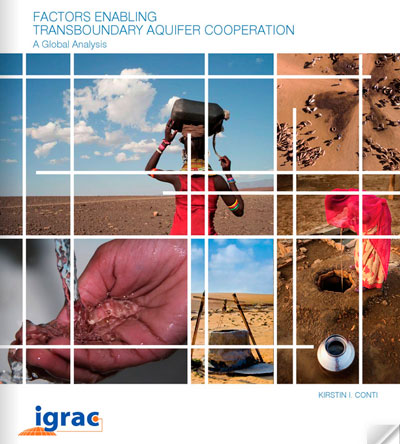
The International Groundwater Resources Assessment Centre (IGRAC) has published the cooperation report 'Factors Enabling Transboundary Aquifer Cooperation: A Global Analysis'. The purpose of this report is to link theory and observations about real occurrences of transboundary aquifer cooperation and answer the question: what factors enable and facilitate cooperation over transboundary aquifers? To this aim, the report outlines current theories about why international water cooperation occurs and subsequently matches these theories with the identified factors that lead to cooperative events. IGRAC operates under the auspices of the World Meteorological Organization (WMO) and UNESCO (as UNESCO Institute - Category II).
>> Access the publication
Building resilience to climate change: World Bank and AfDB partner to improve hydrological and meteorological systems in Africa
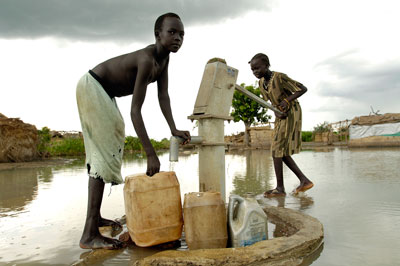
Under the auspices of the recently launched ClimDev-Special Fund (CDSF) , the African Development Bank (AfDB) and the World Bank have completed a seminar on improving the hydrological and meteorological systems in Africa, with the aim of capturing weather and climate data and disseminating information for decision support development planning. The partnership between the AfDB and the World Bank will target the dire state of most hydrometeorological services in the continent and the huge financial resources required to improve them, and the need for institutional capacity support and access to advanced technological platform.
>> More information
UN Secretary-General presents advanced version Synthesis Report on Post-2015 Agenda

UN Secretary-General Ban Ki-moon released an advanced version of his synthesis report on the post-2015 development agenda, titled ’The Road to Dignity by 2030: Ending Poverty, Transforming All Lives and Protecting the Planet’ on 4 December 2014. This report responds to the UN General Assembly call on the UN Secretary-General, in A/RES/68/6 of September 2013, to synthesise inputs on the post-2015 development agenda, as a contribution to the intergovernmental negotiations on the post-2015 development agenda.
In the report Ban proposes six essential elements to facilitate Member States’ deliberations: dignity; people; prosperity; planet; justice; and partnership. On people, for instance, Ban recommends addressing, inter alia: education; health; violence against women and girls; and water, sanitation and hygiene (WASH). The report calls on the post-2015 agenda to promote healthy behaviours, including those related to water, sanitation and hygiene, and to foster sustainable management of water resources. The Secretary-General equally highlights sustainable approaches to water and sanitation as key drivers of sustainable production and consumption, job creation, as well as sustainable and equitable growth.
The official release of the report in all six UN languages is expected by 31 December 2014 and will be formally presented in early January.
>> UN Press Report
>> Synthesis Report of the Secretary-General on the Post-2015 Agenda
>> Briefing by UN Secretary-General (UN Web TV)
1st International Environment Forum for Basin Organizations
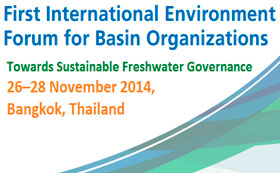
28 November 2014 - The UN Environment Programme (UNEP), in cooperation with the International Network of Basin Organizations (INBO), organised the 1st International Environment Forum for Basin Organizations in Nairobi, Kenya, from 26-28 November 2014. The event brought together managers of river basin organizations, international financial institutions, secretariats of multilateral environmental agreements and UN agencies to share their experiences regarding the implementation of environmental obligations and management of trade-offs concerning the utilisation of water bodies, their associated habitats and ecosystems. The forum discussed themes related to water quality and ecosystem health, the water-energy-food nexus and adaptation to climate change, environmental laws and regulations, and institutional challenges. It included a high-level segment with Ministers and heads of river basin organizations on the way forward for the sustainable governance of freshwater basins.
>> Forum website
Launch of the Food, Energy, Environment and Water (FE²W) Network
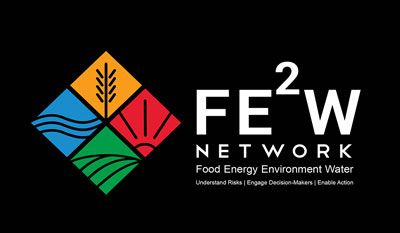
27 November 2014 - UNESCO International Hydrological Programme (IHP) and the Australian National University (ANU)-UNESCO Chair in Water Economics and Transboundary Water Governance officially launched the Food, Energy, Environment and Water (FE²W) Network on 26 November 2014 at UNESCO Headquarters in Paris. FE²W is a network of individuals from academia, the private and public sectors and civil society, who wish to effectively respond to the challenges, risks and opportunities of achieving food, water and energy security while sustaining the environment and enhancing livelihoods, today and into the future. It provides decision-makers at all levels with the knowledge to effectively manage the tradeoffs between the security of food, energy, environment and water.
>> More information
>> FE²W website
UN Human Rights Council appoints new Special Rapporteur on the human right to water and sanitation
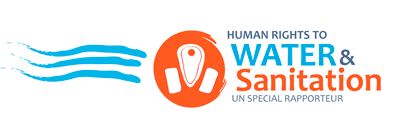
At its 28th Regular Session on 6 November 2014, the UN Human Rights Council appointed Leo Heller from Brazil as Special Rapporteur on the human right to safe drinking water and sanitation. Heller is a Professor of the Department of Sanitary and Environmental Engineering at the Federal University of Minas Gerais in Brazil and has extensive experience in engineering design, policy formulation, teaching and researching in the field of water and sanitation. His professional and academic activities have been guided by the principles of the human right to safe drinking water and sanitation, especially those formulated since the appointment of the previous Special Rapporteur, Catarina de Albuquerque. As Special Rapporteur, Heller will carry out thematic research, undertake country missions, collect good practices and work with key stakeholders on the implementation of the rights to water and sanitation.
>> UN Human Rights Council appointment
>> Special Rapporteur on the human right to safe drinking water and sanitation website
>> UN Web TV broadcast of the 28th Regular Session of the Human Rights Council
Launch of UN Water and Sanitation Best Practices Platform!
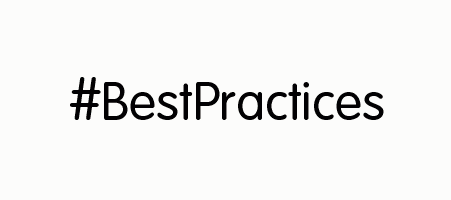
After a Decade of learning, many methods and approaches have been implemented to achieve the water and sanitation targets of the Millennium Development Goals. Now, at the end of the Water for Life Decade, we have access to a collection of best practices that will be important for the Post-2015 period. The UN-Water Decade Programme on Advocacy and Communication (UNW-DPAC) has developed this best practices platform to facilitate examining successfully applied practices and to provide links to useful practices and instructive organizations. The platform enables search by region, country and theme.
These best practices have followed a screening process which includes the Water for Life UN-Water Best Practices Award and UN-Water Zaragoza Annual Conferences. Additional best practices will be added as we continue working with UN agencies and programmes and Member States. We take this opportunity to thank all participants and congratulate you for your hard work!
>> Visit the Best Practices Platform
Bimonthly Publications Review 24 is Out!
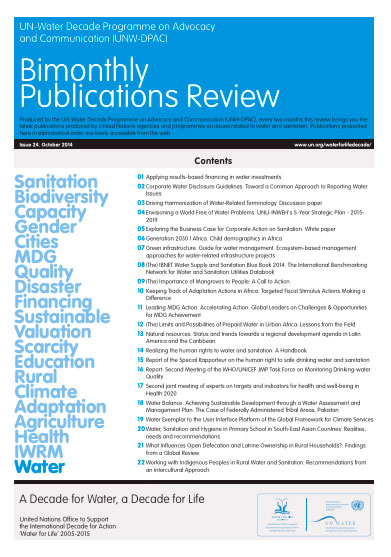
26 November 2014 - Every two months, this review collates publications produced by United Nations agencies and programmes on issues related to water and sanitation. This edition brings together 22 UN publications from a range of water and sanitation issues including: financing, demographics, water utilities, natural resources, the human right to water and sanitation, WASH in schools, etc.
>> Bimonthly Publications Review 24
5th Regional Drought Workshop for Near East and North Africa
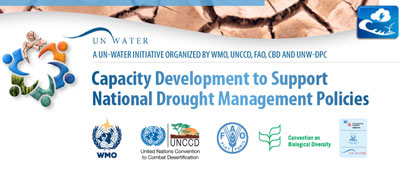
20 November 2014 - Organised by the World Meteorological Organization (WMO), the Food and Agriculture Organization (FAO), the Convention on Biological Diversity (CBD), the United Nations Convention to Combat Desertification (UNCCD), and the UN-Water Decade Programme on Capacity Development (UNW-DPC), the 5th Regional Drought Workshop took place in Cairo, Egypt, from 17-20 November 2014, and identified the capacity needs from national to local levels to develop drought policies and implement risk based drought management strategies. The objective of the joint initiative "Capacity Development to Support National Drought Management Policies" is to increase the capacities in developing countries and countries in transition in developing risk-based national drought management policies.
>> More information
UNECE supports strengthening of dam safety in Central Asia
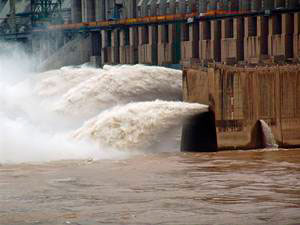
21 November 2014 - Representatives from key authorities and stakeholders from Kazakhstan, Kyrgyzstan, Tajikistan and Azerbaijan along with representatives of international organizations and experts from the Russian Federation gathered in Bishkek on 11-12 November 2014 to participate in a regional meeting on dam safety. The meeting was organised by the United Nations Economic Commission for Europe (UNECE) as part of the implementation of the third phase of the project "Capacity-building for cooperation on dam safety in Central Asia". In addition to exchanging experiences, participants agreed on the project’s work plan for 2015.
>> More information
New GLAAS Report reveals gaps, especially in rural areas
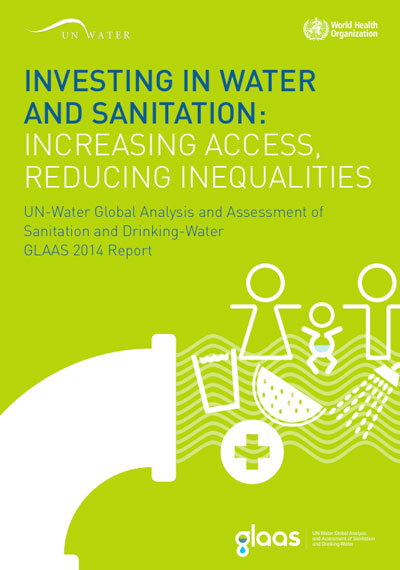
19 November 2014 - According to the new UN-Water Global Analysis and Assessment of Sanitation and Drinking-Water (GLAAS 2014), international aid for water and sanitation is on the rise. Aid commitments are increasingly targeted to underserved regions, notably sub-Saharan Africa, Southern Asia and South-east Asia. GLAAS 2014 also highlights the strengthened targeting of Water, Sanitation and Hygiene (WASH) resources for the poor. However, the report cites a number of key challenges, highlighting insufficient financing, funding gaps in rural areas, weak national capacity to execute WASH plans, critical gaps in monitoring, and neglect for WASH in schools and health facilities. Published biannually, the report presents data from 94 countries and 23 external support agencies. It offers a comprehensive analysis of strengths and challenges in water, sanitation and hygiene (WASH) provision within and across countries.
>> Full UN press release
>> Access GLAAS Report and related documents
SCA and WSSCC partner to educate on menstrual issues and the importance of good hygiene
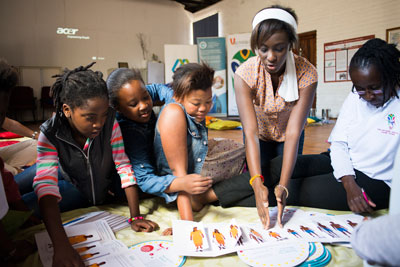
17 November 2014 - SCA, a leading global hygiene and forest products company, and the Water Supply and Sanitation Collaborative Council (WSSCC), entered into an innovative partnership to break the silence around menstruation for women and girls around the world, 17 November. The initiative aims to break the menstrual taboos that jeopardize the health of millions of women every day, raise awareness of menstrual hygiene and empower women and communities to participate fully in society socially, educationally and professionally.
>> More information
1st WHO global report on drowning reveals it is among the 10 leading causes of death for children and young people in every region
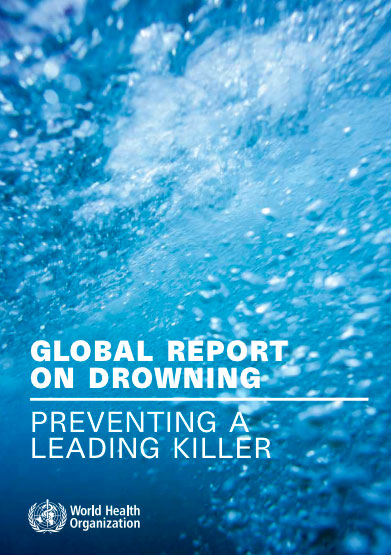
17 November 2014 - The "Global report on drowning: preventing a leading killer" highlights that drowning claims the lives of 372,000 people each year. More than 90% of these deaths occur in low- and middle-income countries such as Bangladesh, Cambodia, China, India, Philippines, Thailand and Vietnam, and the highest rates for drowning are among children under 5 years of age. The report calls for a substantial scaling-up of efforts and resources to prevent drowning and outlines several actions to be taken by both national policy-makers and local communities. It also draws attention to the need to make drowning prevention an integral part of a number of debates, such as climate change which leads to increased flooding; mass migrations, including asylum seekers travelling by boat; and issues such as rural development and water and sanitation. Improving coordination across these various agendas will save lives, according to the World Health Organization (WHO).
>> Full UN press release
>> Access WHO Global report on drowning: preventing a leading killer
Collaborative Approaches and Solutions to Disasters Management Challenges for Small Island Developing States (SIDS)
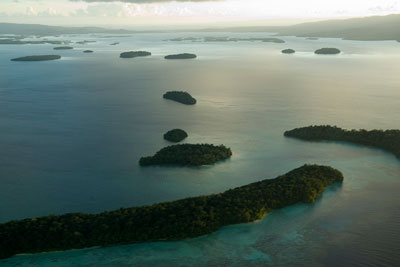
10 November 2014 - The United Nations Department of Economic and Social Affairs (UN-DESA), in collaboration with the United Nations Centre for Regional Development (UNCRD) and other UN agencies, organized in Singapore from 10 to 12 November 2014 a capacity-building seminar on "Collaborative Approaches and Solutions to Disasters Management Challenges for SIDS Municipalities in the Context of Sustainable Development". The seminar brought together relevant stakeholders to discuss the vulnerabilities and challenges of the SIDS municipalities in regard to the increasing occurrence and intensity of natural disasters, impacts of sea-level rise and other risks posed by climate change. It also looked at capacity building for resilience and at various issues including best practices and lessons learned in infrastructure, community-based solutions, finance and resource mobilization and partnerships with private sector.
>> More information
In fight against hunger, UN launches initiative targeting threat of desertification
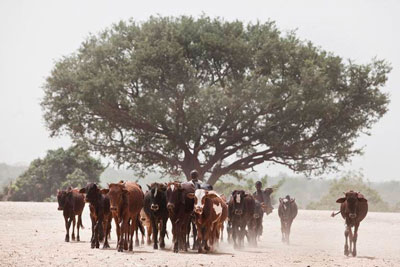
22 October 2014 - The growing menace of desertification poses a distinct threat to the world’s agriculture and eco-systems, the United Nations agriculture agency warned on 22 October, as it announced a new initiative aimed at curbing the spread of land degradation and building resilience to climate change. The programme, named Action Against Desertification and launched by the UN Food and Agriculture Organization (FAO) in partnership with the European Union and the African, Caribbean, and Pacific Group of States (ACP), will devote some €41million to bolstering sustainable land management across the world’s most vulnerable areas in an effort to fight hunger and poverty. "Desertification and land degradation are very serious challenges. They lead to hunger and poverty, themselves at the root of many conflicts," FAO Director-General, José Graziano da Silva, said.
>> Full UN press release
Joint call of UN experts to ensure human right to water for most vulnerable in Detroit
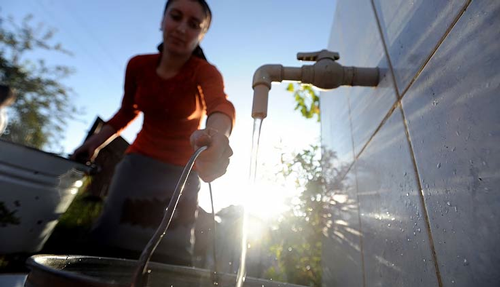
20 October 2014 - Following a visit to Detroit, Michigan, USA, from 18 to 20 October 2014, the UN Special Rapporteurs on the human right to water and sanitation, Catarina de Albuquerque, and on the right to adequate housing, Leilani Farha, expressed their concern regarding the unprecedented scale of water shut-offs taking place in the city. Over 27,000 residences have had water services disconnected this year, disproportionately affecting the most vulnerable and poorest, most of whom are African American. The UN experts stressed that all decisions that affect access to water and to adequate housing for residents of Detroit should be guided by human rights and urged the adoption of a mandatory affordability threshold and the adoption of specific policies to ensure support to people living in poverty.
>> UN News Press Release
>> Joint Press Statement by UN Special Rapporteurs
>> Detroit’s water shut-offs target the poor, vulnerable and African Americans
African Development Bank Group approves Programme to End Drought and Famine Cycles in the Sahel
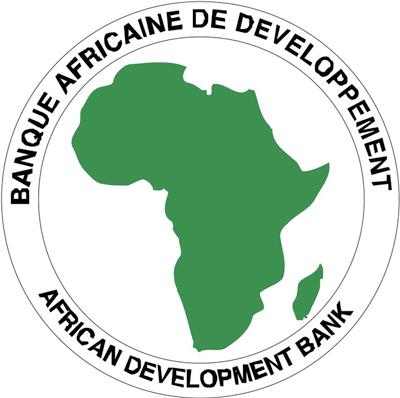
16 October 2014 - The African Development Bank Group approved on 15 October loans and grants amounting to US $231 million to finance a Programme to Build Resilience to Food and Nutrition Insecurity in the Sahel. The Programme aims to eliminate the structural causes of acute and chronic food and nutrition crises by helping vulnerable households to increase their productivity, production and incomes, gain access to infrastructure and basic social services and build a heritage that strengthens their livelihoods in a sustainable manner. Project 1 of the program will construct water mobilization as well as pastoral facilities in targeted rural districts and assist vulnerable households to sustainably manage natural resources and improve nutrition.
>> More information
Members and partners in the UN-Water family are working to prevent Ebola from spreading

15 October 2014 - The simple practice of handwashing with soap not only saves lives, but is also instrumental in the fight against Ebola. Members and partners of UN-Water like UNICEF and the World Health Organization (WHO) are active on the ground to stop transmission, prevent international spread, fight widespread misconceptions about Ebola disease and improve hygiene practices. UNICEF is providing water and sanitation services to the affected communities, particularly through the procurement of water, sanitation and hygiene equipment and supplies, WHO in turn is providing technical advice on safe water and safe management of excreta and wastewater as part of the global response under the newly formed Mission for Ebola Emergency Response (UNMEER).
>> On World Day, UN spotlights handwashing as vital tool in fight against Ebola
>> WHO Ebola response roadmap
>> WHO Global Alert and Response (GAR) website on Ebola
>> UNICEF web section on Ebola
UN Report Calls For Bold and Accelerated Global Action to Meet Biodiversity Targets by 2020

9 October 2014 - Haiti’s fight against cholera has seen significant progress. Still, water-borne diseases are a leading cause for mortality of children in Haiti. In addition, the country has faced one of the most severe cholera outbreaks in modern history, and despite the significant reduction in the new number of cases and deaths, the disease remains endemic. In collaboration with the Government of Haiti, the UN and development partners, the World Bank hosted a high-level conference on "Haiti: Clean Water, Improved Sanitation, Better Health" in Washington D.C. on 9 October 2014. In the context of the Government’s 10 year plan to Eliminate Cholera in Haiti and its Total Sanitation Campaign launched in July 2014, the Conference aimed at bringing together the international community to combat water borne diseases like cholera and raise commitments to provide water, sanitation and health services in the communes most affected by cholera over the next three years. "This meeting was an opportunity for dedicated partners to address the plan to eliminate Cholera in Haiti and to improve access to clean water and sanitation initiatives. Further we need to assure that the commitments are met and Haiti remains on track to eliminate cholera within its borders," said Haiti’s Prime Minister, Laurent Lamothe. About 38% of Haitians lack access to safe drinking water and only 24% of Haitian families have access to improved sanitation.
>> Conference on clean water, improved sanitation, and better health for Haiti
>> Full press release
UN Report Calls For Bold and Accelerated Global Action to Meet Biodiversity Targets by 2020
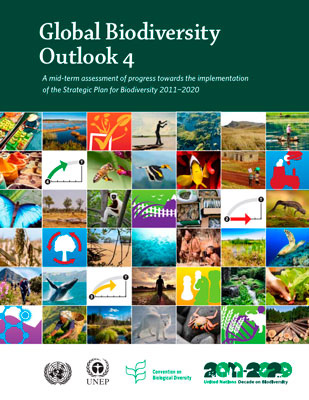
6 October 2014 - Global Biodiversity Outlook 4 shows that there has been significant progress towards meeting some components of the majority of the Aichi Biodiversity Targets. However, in most cases, additional action is required to keep the Strategic Plan for Biodiversity 2011-2020 on course. The report noted that while use of natural resources such as water had become more efficient, our vastly increased consumption levels negated any progress. It also noted that while nutrient pollution had stabilized in the developed world, it was still increasing in other parts of the world with a strong risk to aquatic biodiversity. A key failing highlighted in the report was the continued decreasing global wetland extent.
>> Download Global Biodiversity Outlook 4
>> UNEP press release
>> UN press release: Benefits of investing in protection of biodiversity outweigh financial costs, says UN-backed report
World Water Week 2014 Conclusions Released
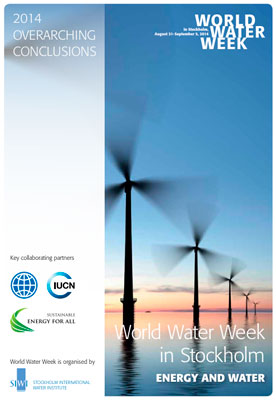
30 September 2014 - The Stockholm International Water Institute (SIWI) released the report ‘2014 Overarching Conclusions: World Water Week in Stockholm, Energy and Water’, which analyzes the discussions that took place during World Water Week 2014 and summarizes themes and conclusions related to the energy-water nexus. World Water Week 2014 was held from 1-6 September 2014, in Stockholm, Sweden, on the theme Water and Energy and counted with the participation of UN-Water and several UN agencies and programmes. The report highlights the close interdependence between the water and energy sectors and the importance of a closer understanding of the dynamics of both sectors in order to provide for sustainable energy and water supplies.
>> Access the report
CEO Water Mandate Releases Final Corporate Water Disclosure Guidelines
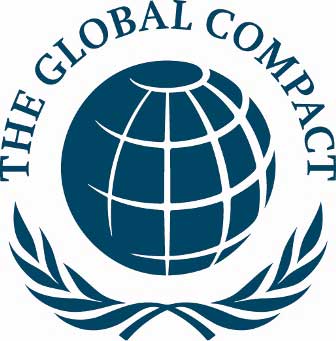
29 September 2014 - The UN Global Compact’s CEO Water Mandate initiative has released the finalized Corporate Water Disclosure Guidelines – a common approach for companies to effectively and intelligibly disclose the many elements of their corporate water management practice to key stakeholders. The Guidelines aim to harmonize reporting approaches, minimizing reporting burdens so companies spend less time on different reports and more time actively managing water.
>> Access the Corporate Water Disclosure Guidelines
Ban urges global leaders to "finish the job", deadline looming
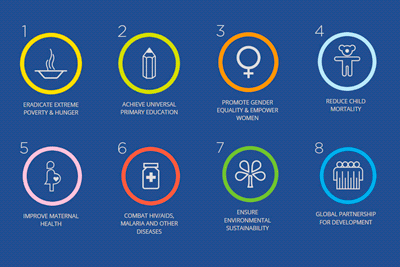
25 September 2014 - Great gains have been made in the global effort to achieve the Millennium Development Goals (MDG), but with the deadline fast approaching more must be done to meet the targets set for 2015 and beyond, UN Secretary-General Ban Ki-moon said. In his remarks to a gathering of 300 global leaders convened by the MDG Advocacy Group, Mr. Ban applauded the successes made so far in pushing forward with the Goals and in having "raised awareness, mobilized resources, and helped shape policy." The meeting also marked the release of the Group’s latest report ‘Accelerating Action: Global Leaders on Challenges and Opportunities for MDG Achievement’. With 462 days until the MDG deadline, the report strikes an optimistic note, adding that with many of the Goals already met – including the reduction of poverty, increasing access to clean drinking water, improving the lives of slum dwellers, and achieving gender parity in schools – many more targets are also within reach by the end of 2015.
But, Mr. Ban warned, much more remained to be done in order to "finish the job."
>> Full press release
>> Access the report
Improving health of women and children "Moral imperative"
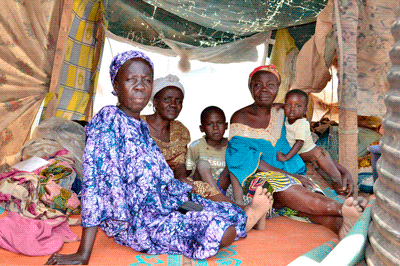
25 September 2014 - Lauding the gains made in improving the health of women and children worldwide, UN Secretary-General Ban Ki-moon called for renewed commitment and action to sustain the unprecedented progress made in this area. "For the first time ever, we have the opportunity to end all preventable deaths of women and children within a generation," Mr. Ban said at the ‘Every Woman Every Child’ event held at UN Headquarters on the margins of the UN General Assembly’s high-level debate. Mr. Ban noted that efforts have led to the reduction in deaths of children under the age of five faster than at any time in the past two decades. Each day, some 17,000 more children survive. Deaths of mothers have been cut by almost half since 1990. "As we advance, we will have to protect these fragile gains – and cope with emerging challenges. Climate change, water, education, sanitation, nutrition and human rights all affect women and children’s health." Launched by the Secretary-General in September 2010, ‘Every Woman Every Child’ aims to save the lives of 16 million women and children by 2015.
>> Full press release
Healthy Ecosystems Key to Better Food Security
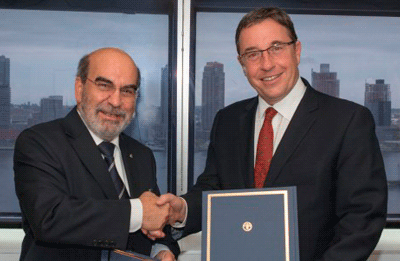
24 September 2014 - The United Nations Environment Programme (UNEP) and the Food and Agriculture Organization (FAO) have signed a memorandum of understanding (MoU) that is set to ensure better support for the functioning of critical ecosystem services that underlie food security. "Healthy ecosystems are the lifeblood of food security, especially in developing countries, where a majority of people are supported directly by the land, seas and oceans," said Achim Steiner, UNEP's Executive Director. The new MoU formalizes the cooperation between the two agencies, in the context of a post-2015 development agenda, including the Sustainable Development Goals (SDGs), particularly with regard to food security and ecosystems services.
>> Full press release
World Toilet Day to highlight open defecation
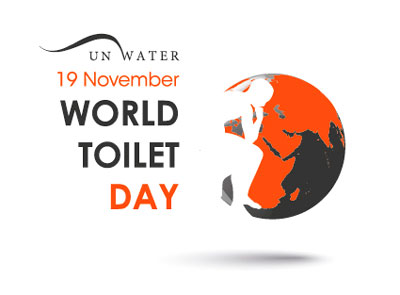
24 September 2014 -2.5 billion people do not have access to a clean and safe toilet. So expect more poos in the news because it’s time to talk toilets! World Toilet Day will take place on 19 November. This year’s issues in focus include open defecation, and the women and violence issues. You can get involved from now. Don’t wait until 19 November, it can be too late! Why not sign up for the Urgent Run to show your solidarity with global sanitation issues?
>> More information on World Toilet Day
Two more weeks to apply for UN-Water Best Practices Award! Nomination deadline extended until 30 September
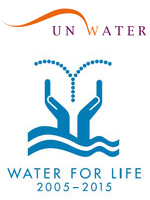
The application period for the 5th edition of the 'Water for Life' UN-Water Best Practices Award has been extended until 30 September This edition's focus is 'Water and Sustainable Development', which mirrors that of World Water Day 2015.
As this year's award will represent the culmination of the 'Water for Life' Decade (2005-2015), the deadline was extended to grant nominating bodies enough time to make this the biggest year yet. Winners will be awarded at a special UN World Water Day ceremony on 22 March 2015 at UN Headquarters in New York in two categories: 'Best water management practices' and 'Best participatory, communication, awareness-raising and education practices'. The ceremony will also provide an opportunity to reflect on the Decade's achievements.
The 'Water for Life' Best Practices Award aims to acknowledge and promote efforts to fulfill international commitments made on water and related issues by 2015, by recognizing outstanding best practices that can ensure sustainable long-term management of water resources and help achieve the water and sanitation targets of the Millennium Development Goals (MDG), Agenda 21 and the Johannesburg Plan of Implementation. The 'Water for Life' Best Practices Award is awarded to projects, initiatives or programmes, rather than individuals or organizations. Self-nominations are not accepted. Candidatures must be submitted through an independent nominating organisation.
Applications are now being accepted until 30 September 2014. If you know of a project that deserves recognition get it nominated!
>> More information
>> Application form
>> Press release
>> Frequently Asked Questions on the Award
>> Previous winners
60 million USD loan approved for water and sanitation in Nepal

22 September 2014 -The Asian Development Bank (ADB) has approved a 60 million USD concessional loan to build water supply and sanitation facilities in 26 small towns across Nepal to meet the rising demand for basic services, improve community health, and reduce flood risks. "Urban centers are growing fast, but access to basic services, including water and toilets is not keeping up, raising the risk of pollution, ill health, and increased poverty," said Fei Yue, Director of the South Asia Urban and Water Division of ADB.
>> More information
Extreme weather dogs Climate Summit
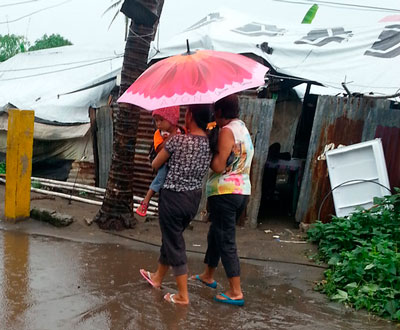
Heavy rains and flooding devastated parts of the Philippines, France and Italy 20-21 September and may be further indications of the ‘new normal’ that the world will have to deal with if no accelerated action is taken to curb global warming, the head of United Nations Disaster Reduction Office said on 22 September on the eve of the UN Climate Summit in New York. The UN Climate Summit on 23 September, convened by UN Secretary-General Ban Ki-moon, is the largest gathering of leaders on climate change to date, which aims to mobilize action and obtain more commitments from Governments and actors of the civil society to reduce greenhouse gas emissions and invest in more resilience and adaptation policies.
>> More information
Water for Life Voices now on Flickr

18 September 2014 -You can now visit the Water for Life Voices Flickr Photostream. We’ve already received hundreds of fantastic images from water projects all over the world. Please come and share your own Flickr images with us, and get updates by following the photo gallery. Any submissions received until 15 December will be eligible for our online exhibit.
>> Water For Life Voices Flickr Photo Gallery
Register for the E-learning course on Governance in Urban Sanitation
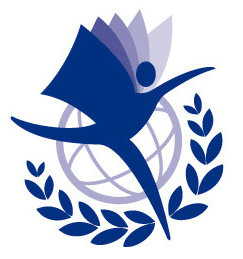
17 September 2014 -The United Nations Institute for Training and Research (UNITAR) is launching an updated version of the e-learning course on ‘Governance in Urban Sanitation’, which will run from 6 October to 12 December 2014. This online course aims to enhance the capacity of local decision-makers to make enlightened decisions and investments in the area of urban sanitation. It provides analytical tools to understand the financial and institutional framework of the sanitation sector, taking into account the needs of urban poor communities. Deadline for registration is 29 September 2014.
>> Register now
Bimonthly Publications Review 23 Out Now!
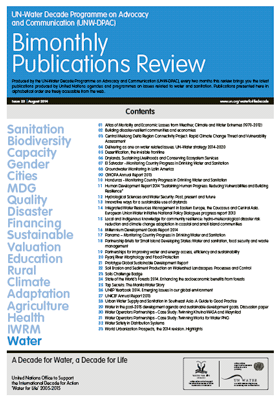
15 September 2014 - Latest United Nations Bimonthly Publications Review contains 33 UN water and sanitation related publications, among which an Atlas of Mortality and Economic Losses from Weather, Climate and Water Extremes; a policy brief on Drylands; a guide to good practice on Urban Water Supply and Sanitation in Southeast Asia or a UNESCO’s discussion paper on Water in the post-2015 development agenda.
>> Bimonthly Review 23
European Union and UNESCO Unite to Protect Lake Ohrid
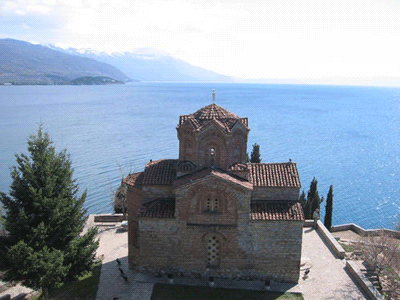
12 September 2014 - The European Union and UNESCO joined forces for the sustainable management of the natural and cultural heritage of the transboundary Lake Ohrid region. Lake Ohrid is one of the oldest lakes in the world, embracing numerous exceptional natural and cultural features. On 15 and 16 September 2014, the Inception Workshop in Pogradec, Albania, kick-started the 36-month project co-financed by the European Union ‘Towards strengthened governance of the shared transboundary natural and cultural heritage of the Lake Ohrid Region’.
>> More information
Handbook ‘Right to Water and Sanitation’ out now
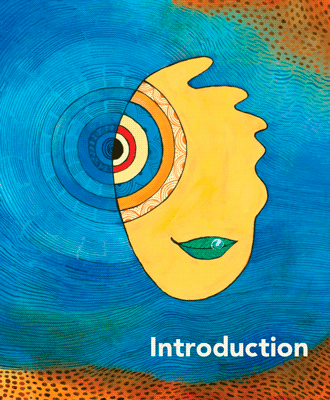
10 September 2014 - UN Special Rapporteur on the Human Right to Safe Drinking Water and Sanitation, Catarina de Albuquerque, has launched a handbook on “Realizing the Human Rights to Water and Sanitation”. Since 2010, when the UN General Assembly recognized the human right to safe drinking water and sanitation, the UN Special Rapporteur has received repeated requests from all kinds of stakeholders to clarify what this human right implies for their work and activities. The book was a collaborative effort in identifying key barriers, challenges and opportunities that stakeholders encounter in realizing the human rights to water and sanitation. This collaborative approach ensures the Handbook is relevant and helpful beyond the mandate of the current Rapporteur.
>> Realising the human rights to water and sanitation Handbook
African Development Bank launches Rural Water Supply and Sanitation Initiative Newsletter

9 September 2014 - This newsletter is designed to update you on programmes, progress and activities in the African Development Bank’s (ADB) rural water supply and sanitation sector (RWSS). In this launch edition, ADB shares some of the Initiative’s notable developments and highlights various strategic events that have taken place, as well as some of the lessons and experiences they have had in pursuit of continental RWSS development goals.
>> RWSS Newsletter
Share your Water For Life Voice with us!
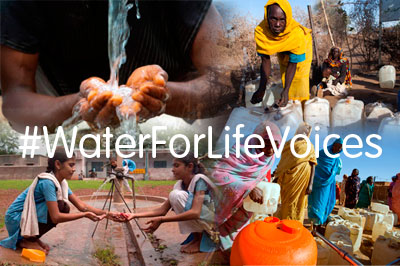
The ’Water for Life’ Decade ends in 2015. The Decade has seen the recognition of the human right to water and sanitation and the achievement of the Millennium Development Goal target of halving the number of people without sustainable access to safe drinking water well in advance of the 2015 deadline. But what does this mean at ground level? Have these advancements improved your daily life? Did your water and sanitation situation improve? Have you benefited from the successes of the Decade?
We welcome your thoughts, messages, photographs, videos and audio related to your water and sanitation situation.
To celebrate the end of the Decade, the United Nations Headquarters in New York will welcome these global voices. Taking place on World Water Day, 22 March 2015, an exhibition is planned to reflect on the successes of the ’Water for Life’ Decade, especially in relation to the Millennium Development Goals, while also looking to the post-2015 development agenda. Your voices will speak directly to UN delegates and guests. We’d like as many voices as possible to reach the delegates who will attend World Water Day in New York!
We would be grateful if you could also help us publicise this campaign and bring together the voices of all those who do not have access to the web.
>> More information about the Water for Life Voices campaign
>> Submit your Voice!
One for all, all for water

31 July 2014 -Some 200 representatives from national, regional and international Non-Governmental Organizations (NGOs), met in Yamassoukro (Cote d’Ivoire) from 30 to 31 July to debate the theme "Access to water for all in Africa". This is the second International Forum of UNESCO’s official NGO partners. It was organized by the UNESCO-NGO Liaison Committee in cooperation with UNESCO’s Secretariat, and supported by the Cote d’Ivoire government.
>> More information
UN expert says rights to safe water, sanitation must not remain mirage for millions of Kenyans
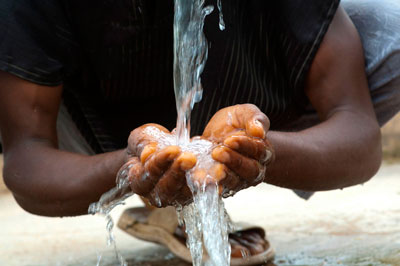
30 July 2014 - While Kenyans have rights to safe water and sanitation on paper, it is now time to turn the law into reality for the millions who do not enjoy these fundamental rights, an independent United Nations human rights expert said at the end of her mission to the country. "Kenya is in a critical transitional moment for the provision of water and sanitation," Catarina de Albuquerque, the Special Rapporteur on the human right to safe drinking water and sanitation, said in a statement. "Kenya is often invoked as a model at the international level due to the constitutional recognition of water and sanitation as human rights. However, there is still a long way to go to realize the human rights to water and sanitation for all."
>> Full press release
Food and Agricultural Organization (FAO) to help flood-affected Serbian farms rebuild

25 July 2014 - The European Union (EU) will partner with FAO to help small-scale farmers in Serbia recover from the devastating floods of the past spring. An EU grant of EUR 8 million, aimed at restoring the livelihoods of the most vulnerable farming families, has been announced. Extraordinary rainfall in mid-May swelled rivers and provoked flooding and landslides. Damage and losses to the agriculture sector are estimated at EUR 228 million. With EU funding, FAO's emergency response will support around 15 000 households in 24 municipalities with crop and livestock packages - including animal restocking - designed to help farmers re-establish production. "The important thing is to enable people to get back to farming and recover their livelihoods as soon as possible" said Vladimir Rakhmanin, FAO Assistant Director-General and Regional Representative for Europe and Central Asia.
>> More information
Persistent vulnerability threatens human development, warns flagship UN report
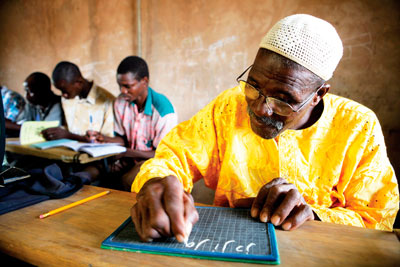
24 July 2014 - Reducing vulnerability and strengthening resilience are critical to securing human development progress, the United Nations says in a flagship report released on 24 July that examines the risks posed by natural or human-induced disasters and crises and offers ways to tackle them. The 2014 Human Development Report, launched in Tokyo by the UN Development Programme (UNDP), says that 1.2 billion people live on $1.25 a day or less. At the same time, the UNDP Multidimensional Poverty Index reveals that almost 1.5 billion people in 91 developing countries are living in poverty with overlapping deprivations in health, education and living standards.
>> Full press release
>> 2014 Human Development Report
UN agency calls for urgent action to protect global soil from depletion, degradation
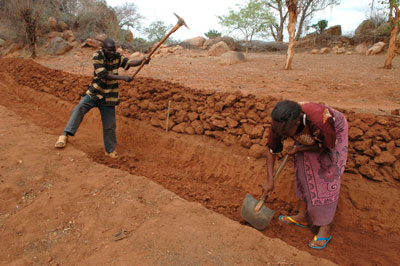
24 July 2014 - The United Nations Food and Agriculture Organization (FAO) is calling for urgent action to improve the health of the world's limited soil resources to ensure that future generations have enough supplies of food, water and energy. "Soil is the basis for food, feed, fuel and fibre production," Maria Helena Semedo, FAO Deputy Director-General, said on 24 July. "Without soils we cannot sustain life on earth and where soil is lost it cannot be renewed on a human timeline."
>> Full press release
Gaza: UN issues emergency appeal, begins airlift to meet urgent humanitarian needs
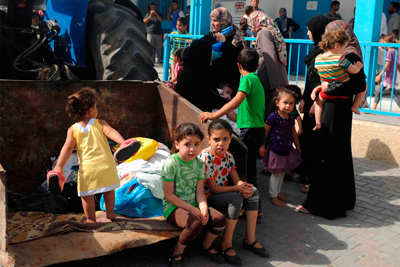
21 July 2014 - The United Nations agency assisting Palestinian refugees has issued an emergency appeal for $60 million (USD) to respond to the urgent humanitarian needs of the people of Gaza. Refugees include tens of thousands who have fled their homes in the wake of the current Israeli military offensive. The UN Relief and Works Agency for Palestine Refugees in the Near East (UNRWA) also noted the number of displaced people seeking safety in its facilities exceeds 84,000 and may soon reach 100,000. The main priority for humanitarian agencies continues to be the provision of food, water, mattresses and hygiene items, as well as fuel for essential water, health and sewage facilities.
>> Full press release
Signature of Policy on the Exchange of Hydrological and Meteorological Data and Information in the Sava River Basin

16 July 2014 - Within the 35th Session of the International Sava River Basin Commission (ISRBC), the representatives of the national hydrological and meteorological services (NHMSs) of the Sava River Basin countries (Slovenia, Croatia, Bosnia and Herzegovina, Montenegro and Serbia) met in Ljubljana (Slovenia) to sign the "Policy on the Exchange of Hydrological and Meteorological Data and Information in the Sava River Basin". The adoption of such a policy presents an opportunity to translate the provisions of the World Meteorological Organization (WMO) Resolutions 25 (Cg-XIII) and 40 (Cg-XII) on the international exchange of hydrological and meteorological data and information into an operational tool.
>> More information
The UN Open Working Group has adopted its final proposal for Sustainable Development Goals
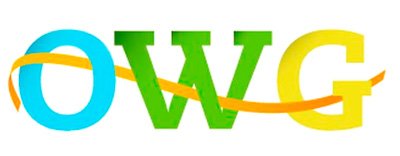
22 July 2014 - The UN Open Working Group (OWG) tasked with formulating a proposed set of Sustainable Development Goals (SDGs) for 2015-2030 convened its last meeting from 14 to 18 July in New York. On 19 July, the Group adopted by acclamation a report (the Zero Draft) containing 17 proposed SDGs and 169 targets.
"The proposal of the Open Working Group brings together a breadth of economic, social and environmental issues in a single set of goals like never before. All those involved in crafting these 17 goals can be proud of themselves," Under-Secretary-General for Economic and Social Affairs Wu Hongbo said in a news release.
Established in 2012 in accordance with the Rio+20 Outcome Document, "The Future We Want", the OWG is an intergovernmental forum gathering 30 members from the five regional groups of the United Nations. The document builds on the results of a 12-month discussion phase.
The SDG final "Zero Draft" will be reviewed by the 68th session of the UN General Assembly from 16 to 29 September 2014. UN Secretary-General Ban Ki-moon will then submit a synthesis report in November, in order to prepare the ground for the final adoption of SDGs in September 2015.
References to water and sanitation issues are found in 5 of the proposed 17 goals and especially under proposed goal 6, "Ensure availability and sustainable management of water and sanitation for all".
>> UN press release
>> Zero Draft Document
>> Sustainable Development Goals
>> Open Working Group
New sanitation campaign aims to end cholera in Haiti
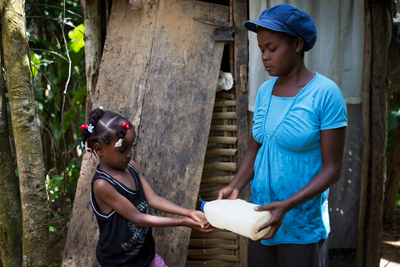
16 July 2014 - UNICEF and the Haitian government intensified the fight against cholera with the launch on 16 July of the National Sanitation Campaign, aiming to eliminate open defecation in the country. The National Sanitation Campaign will target 55 communities in the 10 departments, covering 3.8 million people, 2,500 schools and 500 health centres. "Until every household has access to safe drinking water and sanitation facilities, cholera and other water-borne diseases will remain a potential threat to vulnerable families throughout the country," said Prime Minister Laurent Lamothe. "We count on the support of the UN and that of international partners to make this a reality". The "Community-Led Total Sanitation" (CLTS) approach encourages behaviour change and leadership at community level.
>> More information
Executive summary of United Nations World Water Development Report 5 now available in Japanese
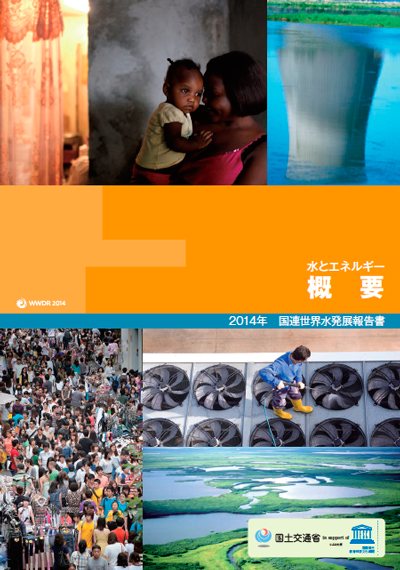
15 July 2014 - The 5th edition of the United Nations World Water Development Report (WWDR 2014) seeks to inform decision-makers (inside and outside the water and energy domains), stakeholders and practitioners about the interlinkages, potential synergies and trade-offs, and to highlight the need for appropriate responses and regulatory frameworks that account for both water and energy priorities. An executive summary of the report has now been made available in Japanese.
>> WWDR 2014 in Japanese
SIDS outcome document agreed
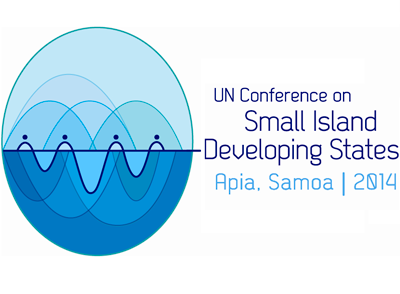
15 July 2014 - The 3rd International Conference on Small Island Developing States (SIDS) will be held from 1 to 4 September 2014 in Apia, Samoa. On 11 July, the SIDS PrepCom decided to submit the draft outcome document agreed to the Conference for adoption. The document recognizes SIDS face numerous challenges with respect to freshwater resources and have included a specific chapter on water and sanitation.
>> Draft outcome document of the 3rd International Conference on Small Island Developing States
Level of human loss, destruction in Gaza ‘immense,’ says UN agency
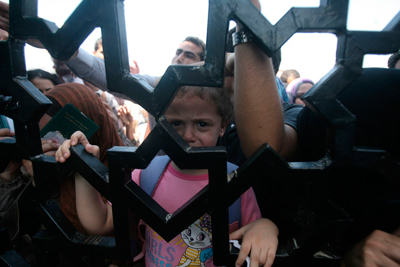
15 July 2014 - The level of human loss and destruction in Gaza as a result of the ongoing conflict with Israel has been "immense," the United Nations agency tasked with assisting Palestinian refugees said, noting that eight days of hostilities has claimed 174 lives and injured well over 1,100 people. "The numbers are increasing by the hour," Sami Mshasha, from the UN Relief and Works Agency for Palestine Refugees in the Near East (UNRWA), told a news conference in Geneva. "We also notice that a good number of those killed and injured are women and children, and that is a cause of concern for UNRWA," he said. The figures as of 14 July: 138 civilians killed, 1,361 injured, 17,000 displaced, 600,000 at risk of losing access to water supply.
>> Full press release
>> UNRWA Report: Gaza in 2020. A liveable place?
>> Gaza Emergency Situation Report (as of 14 July 2014)
Study highlights new agricultural methods and technologies that can save governments millions and conserve vital natural resources
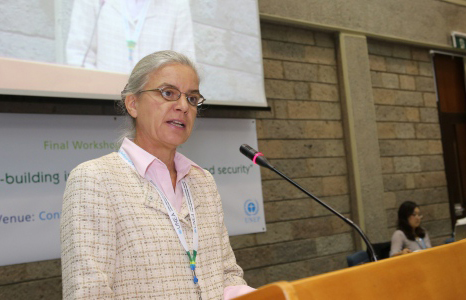
15 July 2014 - A shift in agricultural policy to encourage crop diversification and use of new water and energy saving technologies could save millions of hectare-metres of water annually, as well as millions of dollars in energy costs, finds a new United Nations Environment Programme (UNEP) and partners food security study.
>> Full press release
In Haiti, Ban calls for greater efforts to improve water and sanitation, end cholera epidemic
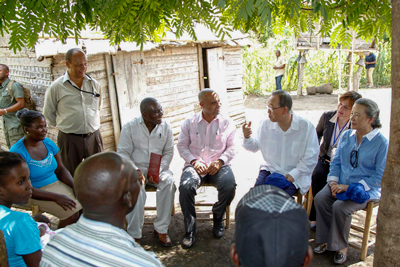
14 July 2014 - UN Secretary-General Ban Ki-moon called for intensified efforts to ensure access to safe drinking water and adequate sanitation in Haiti as he launched a new United Nations-supported initiative and met with families affected by cholera. "As Secretary-General of the United Nations, I want to assure you that the United Nations and its partners are strongly committed to ending the epidemic as quickly as possible. We are making progress, and we will continue to pursue with all our energy our goal of freeing the country from the disease," Mr. Ban said.
>> Full press release
UN WWAP UNESCO Project for Gender Sensitive Water Monitoring Assessment and Reporting
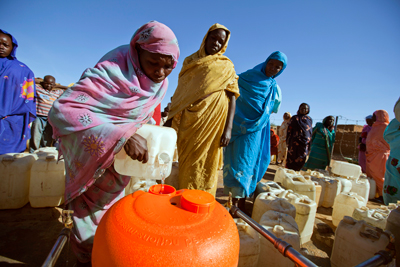
13 July 2014 - The United Nations World Water Assessment Programme (WWAP) has launched a project to develop and test the collection of key gender-disaggregated water data. WWAP is developing a priority set of gender-sensitive indicators and a gender-disaggregated data methodology that will be tested in the field by Member States in different regions. This project will produce a comprehensive methodology for gender-disaggregated data gathering and will yield the first-ever set of gender-disaggregated data on topics such as women's water empowerment and participation in water decision making.
>> More information
World’s population increasingly urban with more than half living in urban areas
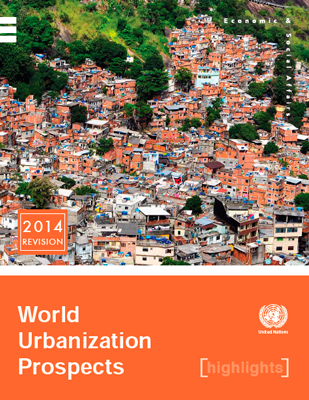
10 July 2014 - Today, 54% of the world’s population lives in urban areas, a proportion that is expected to increase to 66% by 2050. Projections show that urbanization combined with the overall growth of the world’s population could add another 2.5 billion people to urban populations by 2050, with close to 90% of the increase concentrated in Asia and Africa, according to a new United Nations report launched on 10 July. The 2014 revision of the World Urbanization Prospects by the United Nations Department of Economic and Social Affairs’ (UNDESA) Population Division notes that the largest urban growth will take place in India, China and Nigeria. As a result, these countries will face numerous challenges in meeting the needs of their growing urban populations, including sufficient housing, infrastructure, transportation, energy and employment, as well as for basic services such as education, water and sanitation.
>> Full press release
>> 2014 Revision of the World Urbanization Prospects
The World Meteorological Organization (WMO) and the World Health Organization (WHO) establish joint office for climate and health

8 July 2014 - The World Health Organization and the World Meteorological Organization have joined forces to tackle the increasing risks to human health posed by weather and climate hazards such as extreme temperatures, floods, droughts and tropical cyclones. A new WHO/WMO Climate and Health office has been established under the auspices of the Global Framework for Climate Services (GFCS) to promote the coordinated development and use of climate services to improve public health. It will increase awareness, build capacity, and connect meteorological services with experts in the health sector in an active partnership for climate adaptation and risk management.
>> More information
Momentum builds to achieve more Millennium Development Goals by end of 2015: UN report
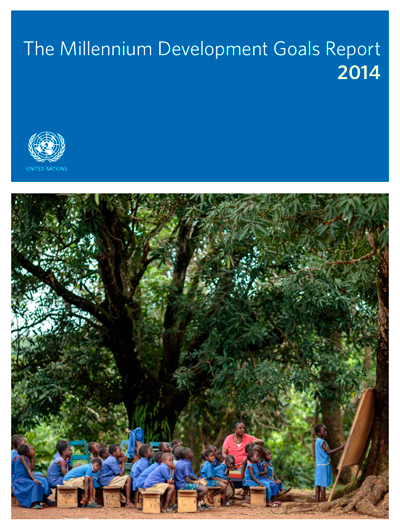
7 July 2014 - Millions of people’s lives have improved due to concerted global, regional, national and local efforts to achieve the Millennium Development Goals (MDGs), which serve as the foundation for the next global development agenda, according to the MDG Report 2014, launched on 7 July 2014 by UN Secretary-General Ban Ki-moon. With many MDG targets already met on reducing poverty, increasing access to improved drinking water sources, improving the lives of slum dwellers and achieving gender parity in primary school, The Millennium Development Goals Report 2014, says many more targets are within reach by their 2015 target date. Since 1990, 2.3 billion people have gained access to an improved drinking water source. Over one-quarter of the world’s population has gained access to improved sanitation since 1990, yet one billion people still resort to open defecation. Much greater effort and investment will be needed to alter inadequate sanitation facilities
>> Full press release
>> UN Press release
>> Millennium Development Goals Report 2014 
2015 'Water for Life' UN-Water Best Practices Award invites nominations

4 July 2014 - The 'Water for Life' UN-Water Best Practices Award is now accepting nominations for its 5th edition. The theme is 'Water and Sustainable Development', which mirrors that of World Water Day 2015.
This year's award will represent the culmination of the 'Water for Life' Decade (2005-2015). Winners will be awarded at a special UN World Water Day ceremony on 22 March 2015 at UN Headquarters in New York in two categories: 'Best water management practices' and 'Best participatory, communication, awareness-raising and education practices'. The ceremony will also provide an opportunity to reflect on the Decade's achievements.
The 'Water for Life' Best Practices Award aims to acknowledge and promote efforts to fulfill international commitments made on water and related issues by 2015, by recognizing outstanding best practices that can ensure sustainable long-term management of water resources and help achieve the water and sanitation targets of the Millennium Development Goals (MDG), Agenda 21 and the Johannesburg Plan of Implementation.
The 'Water for Life' Best Practices Award is awarded to projects, initiatives or programmes, rather than individuals or organizations. Self-nominations are not accepted. Candidatures must be submitted through an independent nominating organisation.
Applications are being accepted from 4 July to 15 September 2014. If you know of a project that deserves recognition get it nominated!
>> More information
>> Press release
>> Frequently Asked Questions on the Award
>> Previous winners
Deadline extended until 28 July 2014: nominate or apply for the position of Special Rapporteur on the human right to safe drinking water and sanitation

2 July 2014 - The mandate of the Special Rapporteur on the human right to safe drinking water and sanitation was established to examine crucial water and sanitation issues and provide recommendations to Governments, the United Nations and other stakeholders. Ms. Catarina de Albuquerque, current Special Rapporteur, finishes her term at the end of October 2014. Deadline for applications is extended until 28 July 2014.
>> More information
Initial UN report aims to "reconnect science and policy towards global sustainable development"

1 July 2014 - To achieve a sustainable transition by 2050, when more than nine billion people will live on Earth, there needs to be significant adjustment to the current patterns of consumption and production, delegations heard today as a United Nations high-level political forum considered a new report aiming to lay the foundation for a new global sustainable development agenda. The "prototype" Global Sustainable Development Report, created by the UN Department of Economic and Social Affairs (UNDESA), looks three generations back — from 1950 to 2013 — and 40 years into the future to 2050, to learn from what was tried, in order to put economies and societies on the path of sustainable development.
>> Full press release
>> Global Sustainable Development Report
UN initiative strengthens drought monitoring and early warning in Asia-Pacific
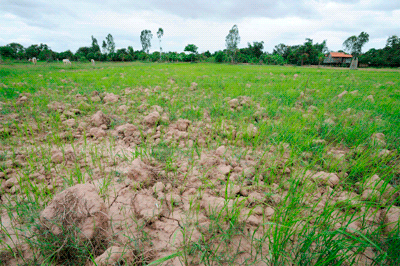
1 July 2014 - Although drought is a "silent killer" in Asia and the Pacific, access to scientific information and knowledge remain a challenge for many countries in the region, the United Nations Economic and Social Commission for Asia and the Pacific (ESCAP) said today at a milestone forum on drought monitoring and early warning. In 2013, ESCAP launched the Regional Drought Mechanism – a platform providing timely and free satellite-based data; products; and training to regional drought-prone countries – to enhance the capacity of Governments for agricultural monitoring and early warning.
>> Full press release
Widespread water shut-offs in US city of Detroit prompt outcry from UN rights experts

25 June 2014 - Disconnecting water from people who cannot pay their bills is an affront to their human rights, a group of United Nations experts said today, amid reports of widespread water shut-offs in the United States city of Detroit for non-payment. "Disconnection of water services because of failure to pay due to lack of means constitutes a violation of the human right to water and other international human rights," the experts stated in a news release.
>> More information
Documents of the 21st session of the IHP Intergovernmental Council
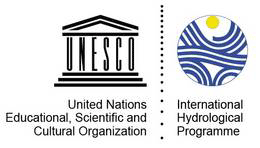
22 June 2014 - Documents from the 21st session of the Intergovernmental Council of the International Hydrological Programme (IHP) of UNESCO, which took place from 18-20 June 2014 in Paris, France, are now available online.
>> Documents from 21st session
FAO and the World Water Council step up their partnership
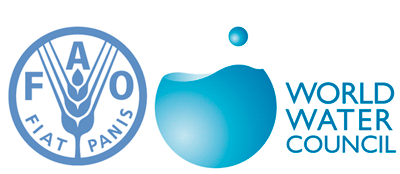
18 June 2014 - The Food and Agriculture Organization of the United Nations (FAO) and the World Water Council (WWC) have agreed to intensify their collaboration in a bid to strengthen global water and food security. Long-time partners, the two organizations will expand their joint work on a number of fronts, including: knowledge and technology development to enhance water productivity; the education of water management professionals and building human capital development in the water sector; and promoting sound water policymaking and better cooperation within the water and irrigated agriculture sectors.
>> More information
World Water Development Report 4: Now available in Chinese!

17 June 2014 - The UN World Water Development Report 4 (WWDR4) "Managing Water under Uncertainty and Risk" is now available in Chinese. This has been realized thanks to the generous support of the Ministry of Water Resources of the People's Republic of China, the Chinese National Committee for the International Hydrological Programme (IHP) and China Water Power Press.
>> WWDR4 in Chinese
Human rights are key to ensure an ambitious post-2015 development framework
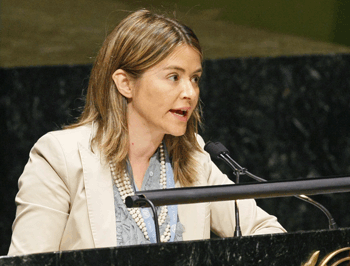
17 June 2014 - Ms. Catarina de Albuquerque, the UN Special Rapporteur on the human right to safe drinking water and sanitation, addresses an open letter to all UN Member States expressing her satisfaction at the significant advances in the protection and promotion of the human right to water and sanitation as reflected in the latest working document ("Zero Draft") from the Open Working Group on the Sustainable Development Goals.
>> Open letter from the Special Rapporteur
>> Zero draft document
UNDP-led initiative announces recipients of its Equator Prize

9 June 2014 - The Equator Prize, led by the United Nations Development Programme (UNDP), recognizes outstanding local sustainable development solutions for people, nature and resilient communities. The Prize recognized 12 winners for their efforts on sustainable management at a ceremony in Nairobi, Kenya, on World Day to Combat Desertification. These include ‘Water is Hope’ in Tajikistan, a project which uses community-elected water custodians to ensure equitable water distribution; or the project ‘Alliance for Integrated Development in Nepal’, a women-led wetlands user group that uses agro-forestry, organic farming and wildlife management to manage a manmade reservoir; among others.
>> More information
Proposed goals and targets on Sustainable Development for the Post2015 agenda now available

5 June 2014 - In preparation for the Open Working Group (OWG) on Sustainable Development Goals (SDGs) informal consultations 9 to 11 June 2014, an initial zero draft of the proposed goals and targets was made available.
During the informal consultations, Member States will have an opportunity to consult on the proposed goals, their targets and means of implementation contained in the zero draft.
The priority target has been suggested as the eradication of poverty, the biggest global challenge facing the world today. The draft contains 17 proposed goals to be attained by 2030, including secure water and sanitation for all for a sustainable world. This goal focuses on the provision of universal access to safe and affordable drinking water and sanitation; improved water quality through reduced pollution; improved water efficiency in all sectors; integrated water resource management, including transboundary cooperation; sustainable extraction of freshwater supplies; reducing the mortality and economic losses caused by natural and human-induced disasters and the provision of adequate facilities and infrastructure in supplying safe drinking water and sanitation.
The new goals reflect a flexible global vision, recognising that each country faces specific challenges to achieve sustainable development, and underscoring the special challenges facing the most vulnerable countries, in particular, African countries, least developed countries, landlocked developing countries and small island developing States, as well as the specific challenges facing the middle-income countries.
>> More information
Deadline for WASH Media Awards approaches

4 June 2014 - The Water Supply and Sanitation Collaboration Council (WSSCC) and Stockholm international Water Institute (SIWI) are accepting entries for the 5th edition of the WASH (Water, Sanitation and Hygiene) Media Awards. The WASH Media Awards are part of a broader goal to foster sustainable relations with journalists in developing and developed nations, and increase the media coverage of WASH issues. Entries must be published or broadcast between 15 June 2013 – June 2014 within the themes Water and Energy; Equity and inclusion in Water, Sanitation and Hygiene; Ending Open Defecation; Human Right to Water; WASH in the Future – Post-2015 and monitoring WASH commitments. There are 6 prize awards, plus the opportunity to participate in World Water Week in Stockholm 31 August – 5 September 2014. Deadline for applications is 15 June 2014.
>> More information
Late, erratic rainfall causes food shortage in Somalia – Food and Agricultural Organization of the United Nations (FAO) calls for action

2 June 2014 - Water scarcity in Somalia caused by late rains and erratic weather patterns has created concern over a depleted harvest. The situation is being exacerbated by conflict and inadequate funding for priority actions designed to address the needs of hard-hit communities, according to a new Global information and Early Warning System (GIEWS) report by the Food and Agriculture Organization (FAO). "The people of Somalia cannot afford to wait to see how the next harvest turns out. They need urgent support to improve their food security and maintain their livelihoods, most of which depend directly on agriculture," said Luca Alinovi, acting Head of FAO's Somalia Office and FAO Representative in Kenya. The number of people in need of humanitarian assistance in Somalia is currently estimated at about 860,000, including over 200,000 malnourished children under five years of age.
>> More information
>> FAO call for action
Nominate or apply for the position of Special Rapporteur on the human right to safe drinking water and sanitation

28 May 2014 - Having access to safe drinking water and sanitation is central to living a life in dignity and upholding human rights, yet billions of people still do not enjoy these fundamental rights. The rights to water and sanitation require that these are available, accessible, safe, acceptable and affordable for all without discrimination. The mandate of the Special Rapporteur on the human right to safe drinking water and sanitation was established to examine these crucial issues and provide recommendations to Governments, to the United Nations and other stakeholders. Ms. Catarina de Albuquerque, current Special Rapporteur, finishes her term at the end of October 2014 and the position is open for applications until 30 June 2014.
>> More information
The message on Open Defecation is taken to a broader audience, with the help of Sesame Street

28 May 2014 - The United Nations has declared it is time to talk openly about open defecation, launching a new campaign to end the practice and improve access to toilets and latrines for the 2.5 billion people worldwide without basic sanitation. At the campaign launch in New York on 28 May, UN Deputy Secretary-General Jan Eliasson introduced the words “toilets” and “open defecation” into the diplomatic discourse, saying that people get embarrassed when these words are used. "It’s not a disease, it’s not a dictator or a regime, it’s not a war, it’s not a weapon, it’s not an act of terrorism. I’m talking about the practice of open defecation" he said, noting that poor sanitation, which costs around $260 billion in gross domestic product (GDP) annually, should be given international attention. As part of the launch, Raya, a new Sesame Street Muppet to engage children with important messages surrounding proper latrine use and sanitation, made a special report on the importance of good sanitation.
>> More information
eThekwini Water and Sanitation, winner of 1st edition of ‘Water for Life’ Award, named 2014 winner of Stockholm Industry Water Award
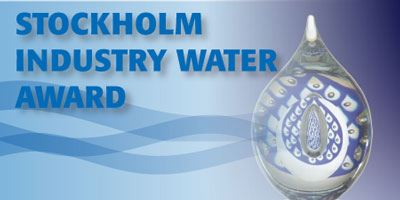
28 May 2014 - In the past 14 years, 1.3 million additional people in greater Durban, South Africa, have been connected to piped water and 700,000 people have been provided with access to toilets. In addition to successfully providing basic services to a large and diverse population, eThekwini Water and Sanitation is at the forefront of exploring technical and social solutions; it has been a busy decade and a half and now the hard work and foresight of many has been acknowledged for its inspirational message in the Water and Sanitation sector. The Municipality of eThekwini Water & Sanitation in South Africa has been named 2014 winner of the Stockholm Industry Water Award, for its transformative and inclusive approach to providing water and sanitation services. The award comes after winning the category 2 ‘Best participatory, communication, awareness-raising and education practice’ 1st edition of ‘Water for Life’ UN-Water Best Practices Award in 2011. As part of the ‘Water for Life’ Best Practices Award the video ‘Water: our life, our future’ describes the different components of eThekwini water and sanitation initiative.
>> Watch the video "Water: our life, our future"
>> More information
UNECE welcomes the entry into force of the United Nations Watercourses Convention
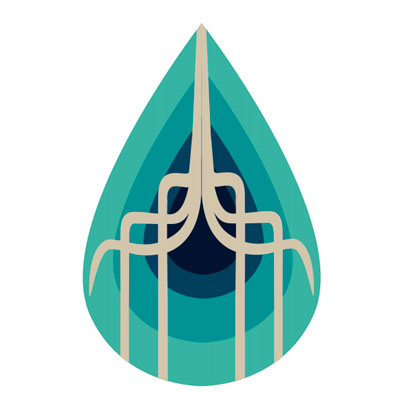
23 May 2014 - The 1997 United Nations Convention on the Law of the Non-Navigational Uses of International Watercourses (United Nations Watercourse Convention) will enter into force on 17 August 2014. When Viet Nam joined the convention on 19 May 2014, the required total of 35 parties was reached. Mr. Michael Møller, Acting Executive Secretary of the United Nations Economic Commission for Europe (UNECE) said he welcomes this “breakthrough for transboundary water cooperation and international water law worldwide.” The 1997 United Nations Watercourses Convention seeks to ensure the development, conservation, management and protection of international watercourses and the promotion of their optimal and sustainable utilization.
>> More information
UN bimonthly publications review 21 now available!

20 May 2014 - The 21st edition of UN Bimonthly Publications Review is now available. Every two months, the review collates publications produced by United Nations agencies and programmes on issues related to water and sanitation. This edition brings together 31 UN publications from a range of water and sanitation related issues including: biodiversity, climate change, integrated water resources management (IWRM), gender, health and many more. All publications are available online as free downloadable PDFs.
>> Bimonthly Publications Review 21
Syria: Violation of the right to water in Aleppo unacceptable, say UN experts
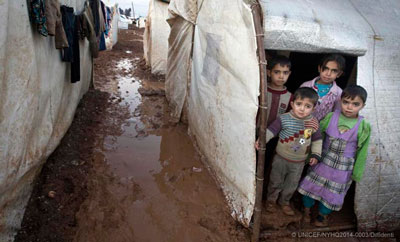
16 May 2014 - Two UN experts have warned "Interference with water supplies even in the context of an ongoing conflict is entirely unacceptable" in reference to a recent incident in which the city of Aleppo has had intermittent water since the beginning of May 2014, with a total cut in supply from 10 May with perhaps a million people left without access to water and sanitation. The experts stressed "depriving people of their right to access safe water, not only denies them a basic and fundamental human right, but also an essential element to support life and health" adding that "if deliberate, the targeting of a civilian population to deprive it of essential supplies such as water is a clear breach of both international humanitarian and human rights law which binds all parties."
>> More information
>> Statement from UN Secretary-General
The UN Global Vote for a Better World sees water and sanitation as the 5th most voted issue
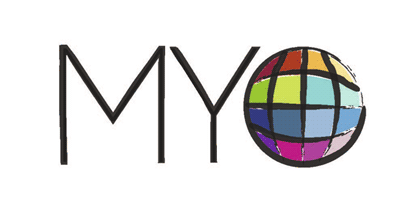
14 May 2014 - The Global Week of Action, which concluded on 11 May, aimed at gathering 500,000 additional votes for MY World UN global survey. The survey provides an opportunity for citizens to have their voice heard and contribute with their priorities and views to the new development agenda for the world. The initiative, led by the United Nations Millennium Campaign, asks citizens to rank 16 priorities that would make the most difference to their lives, ranging from reliable energy at home to protecting forests, rivers and oceans. The survey has seen to date the participation of around 2 million people with more than 885,000 votes going to water and sanitation, ranking this issue the 5th most voted after education, health care, an honest and responsive government and better job opportunities. Votes, to be collected until 2015, will inform the post-2015 process and be used to guide decision-makers in the formulation of the new agenda. These results were presented to the UN General Assembly on 16 May.
>> Results from the survey
WHO/UNICEF report highlights need to further reduce gaps in access to improved drinking water and sanitation
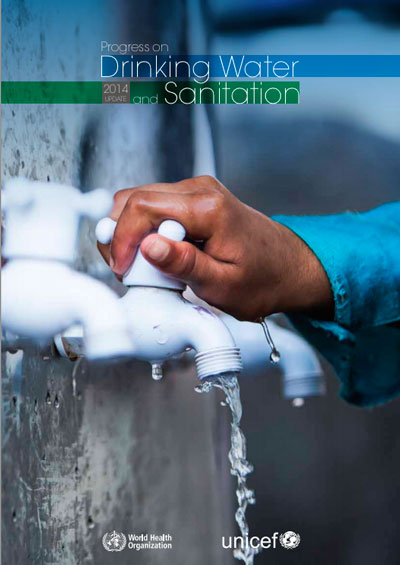
8 May 2014 - Since 1990, almost 2 billion people globally have gained access to improved sanitation, and 2.3 billion have gained access to drinking-water from improved sources. Some 1.6 billion of these people have piped water connections in their homes or compounds, according to a new WHO/UNICEF report ‘Progress on drinking water and sanitation: 2014 update’, which also highlights a narrowing disparity in access to cleaner water and better sanitation between rural and urban areas.
"The vast majority of those without improved sanitation are poorer people living in rural areas. Progress on rural sanitation – where it has occurred – has primarily benefitted richer people, increasing inequalities," said Dr Maria Neira, WHO Director for Public Health, Environmental and Social Determinants of Health.
"Too many people still lack a basic level of drinking water and sanitation. The challenge now is to take concrete steps to accelerate access to disadvantaged groups. An essential first step is to track better who, when and how people access improved sanitation and drinking water, so we can focus on those who don’t yet have access to these basic facilities," she added.
The report presents estimates for 1990-2012 and is based on data from nationally representative household surveys and censuses for the same period. It reveals that by 2012, 116 countries had met the Millennium Development Goal (MDG) target for drinking water, 77 had met the MDG target for sanitation and 56 countries had met both targets. MDG 7.C aims to halve, by 2015, the proportion of the population without sustainable access to safe drinking water and basic sanitation.
>> Full press release
>> Progress on drinking water and sanitation: 2014 update
Philippines: Six months after typhoon, UN working with communities to rebuild lives
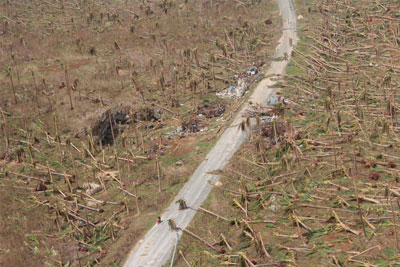
7 May 2014 -Six months after Typhoon Haiyan devastated the Philippines, while signs of recovery are starting to emerge, progress remains fragile, the United Nations said urging continued international support for the 14 million people affected. Haiyan is the biggest typhoon recorded in almost a century, and according to the UN Office for the Coordination of Humanitarian Affairs (OCHA), it killed thousands and affected nearly 9.8 million people, displaced some 4 million people and destroyed 500,000 homes. The storm also devastated the country’s infrastructure, hospitals, schools and public services, causing $12 billion in estimated damages. The UN humanitarian agencies and their partners in the Philippines are now prioritizing projects on shelter and livelihoods, while continuing to assist the most vulnerable people with assistance and protection services.
>> More information
Afghanistan plea for help on Disaster Risk Reduction

6 May 2014 - The Afghanistan National Disaster Management Authority (ANDMA) has made an urgent appeal for greater support on disaster risk reduction efforts in the disaster-prone country following the large loss of life from mudslides in Badahkshan province. Afghanistan along with 13 other countries agreed in 2011 to the Istanbul Process on Regional Security and Cooperation for a Secure and Stable Afghanistan which intends to organize disaster response seminars, to improve knowledge and experience on dealing with the impact of disasters and to set up regional early warning systems in particular for droughts and other water-related threats. The United Nations International Strategy for Disaster Risk Reduction (UNISDR) is working with ANDMA and other UN agencies to support the process.
>> More information
Good Hand Hygiene by health workers protects patients from drug resistant infections
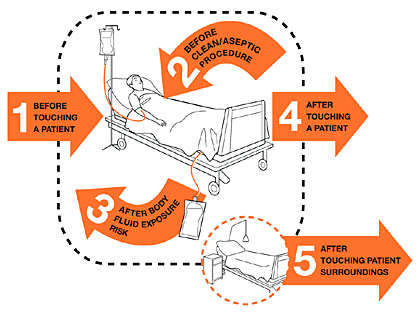
6 May 2014 - On Hand Hygiene Day (5 May), the World Health Organization (WHO) urged health workers to practice good hand hygiene when caring for patients, to protect them from contracting infections in health facilities. WHO has issued a major global report on antimicrobial resistance documenting high rates of resistance in bacteria that cause common infections in all regions of the world. Initial results confirm that resistance is very frequent in bacteria isolated in health-care facilities. “There is clear scientific evidence that good hand hygiene by health workers reduces healthcare-associated infections caused by resistant germs”, says Professor Benedetta Allegranzi, technical lead of the WHO Clean Care is Safer Care programme and of the activities planned for Hand Hygiene Day.
>> Full press release
>> More information on WHO’s campaign "Save Lives: Clean Your Hands"
World Water Day 2015 will focus on ‘Water and Sustainable Development’

2 May 2014 -"Water and Sustainable Development" is the theme for next year’s World Water Day, which will be coordinated by the United Nations Development Programme (UNDP) with the support of different UN agencies. 2015 is a key milestone for the international community as the Millennium Development Goals (MDGs) come to their end and international negotiations on the post-2015 development agenda conclude in September.
As dry season ends in Haiti, significant gains seen in fight against cholera, UN official says
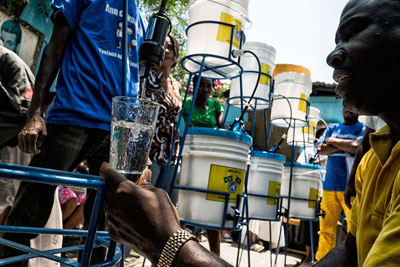
1 May 2014 - Significant gains in the fight against the cholera epidemic in Haiti have been recorded as the dry season ends and the United Nations continues to support the Government's comprehensive strategy of monitoring, rapid response and planning for long-term solutions. "Interventions are based on identifying where cholera occurs; then very rapid intervention teams go in and deploy a number of different measures including identifying, isolating and a whole range of water and sanitation-related activities that improve the environment and reduce the risk of the disease spreading," Mr. Peter de Clercq, Deputy Special Representative for the UN Secretary-General in Haiti, said.
>> More information
UN agency honours traditional farming sites in China, Iran, Republic of Korea

1 May 2014 -The birthplace of jasmine tea and a nearly 3,000 year old irrigation system are among the traditional farming sites designated "globally important" land use systems or landscapes by the United Nations Food and Agriculture Organization (FAO). Globally Important Agricultural Heritage Systems (GIAHS) are considered "models of innovation, sustainability and adaptability, delivering important benefits to the ecosystem". The new designations include Iran's Qanat Irrigation system, an ancient network of farms that have survived for nearly three millennia; a 22-thousand-kilometer system of black stone walls built from volcanic rock in Jeju, Republic of Korea; and the traditional Gudeuljang Irrigated rice terraces in Cheongsando, Republic of Korea. Also on the list are a trio of sites in China: the Xinghua Duotian Agrosystem famous for its method of water-land utilization; the historic Jasmine and Tea Culture System of Fuzhou City where the tea scenting method was first invented more than 1000 years ago; and, the Jiaxian Traditional Chinese Date Gardens recognized, as the place with the longest history of jujube cultivation.
>> More information
The Madrid Initiative: A global strategy to provide access to safe water and sanitation in health centres
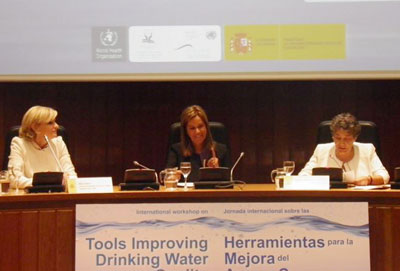
24 April 2014 - As a result of the international meeting on tools for improving drinking water quality, organized by the Ministry of Health, Social Services and Equality of Spain from 21 to 23 April in collaboration with the World Health Organization (WHO) and the UN-Water Decade Programme on Advocacy and Communication (UNW-DPAC), the WHO has proposed this 23 April the "Madrid Initiative", a global strategy to provide access to safe water and sanitation in health centres in order to reduce maternal mortality. The initiative has been announced by Maria Neira, director general of health and the environment of the World Health Organization (WHO).
>> More information
Experts adopt UN action plan to respond need for improved water disaster responses

18 April 2014 - An action plan presented at a UN meeting which took place on 16-17 April in New Delhi, India, has been adopted in order to reduce disaster risks and build resilience in South and South-west Asia by managing information more efficiently. The plan will enhance the capacity of governments in the region to be better prepared and more resilient through improved infrastructure. Disaster risk in South and South-West Asia is not only seriously high but also compounded by seismic and hydro-meteorological hazards such as earthquakes, floods and cyclones, drought and tsunamis. The action plan was adopted at this Expert Group Meeting jointly organized by the ICT and Disaster Risk reduction Division of UNESCAP and the ESCAP South and South-West Asia office.
>> More information
2014 High Level Meeting of Sanitation and Water for All (SWA) concludes with over 250 individual commitments to speed up access to water and sanitation
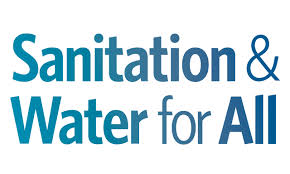
12 April 2014 - The High Level Meeting of Sanitation and Water for All, which took place on 11 April 2014 and included participation from the UN Secretary-General Ban Ki-moon, President of the World Bank Jim Yong Kim and Executive Director of UNICEF Anthony Lake, concluded with over 40 SWA partner countries making more than 250 specific commitments aimed at increasing the quantity and improving the use of financial resources, reducing inequality in access, building capacity of institutions charged with delivering water and sanitation services and coordinating resources more effectively, both from governments and donor aid.
>> More information and recording of the meeting
UN launches decade-long initiative to promote sustainable energy for all

9 April 2014 - The United Nations launched an initiative aimed at promoting renewable energy and energy efficiency worldwide to the business community of the Decade of Sustainable Energy for All (2014 - 2024), with a forum to take place annually, starting this coming June. The initiative has three main objectives: ensuring universal access to modern energy services, doubling the global rate of improvement in energy efficiency and sharing renewable energy globally. Currently, one out of five people lives without access to electricity. Nearly 40 per cent of the world's population rely on wood, coal, charcoal or animal waste to cook food, leading to nearly two million deaths a year – mostly women and children – from lung disease caused by toxic smoke in their homes. The initiative stresses that finding ways to address this energy poverty while also reducing greenhouse gas emissions and tackling climate change is a crucial global challenge.
>> More information
Haiti: Senior UN official urges donor community to ramp up efforts to tackle cholera
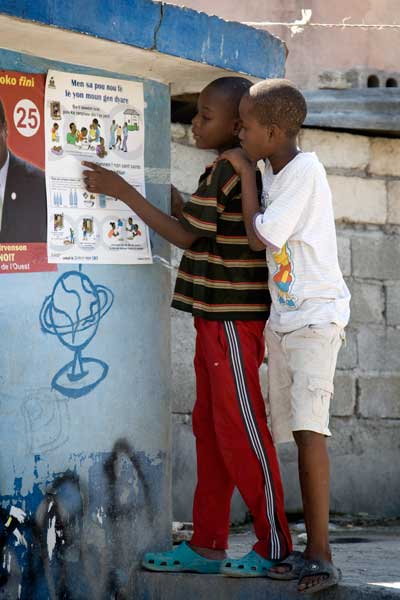
1 April 2014 - The United Nations official tasked with coordinating the response to the cholera epidemic in Haiti says the country is not receiving the international attention it deserves, and is calling on the donor community to scale up support to combat the disease. The UN has worked with partners in the community and international groups to launch a series of actions, including establishing/upgrading cholera treatment facilities, constructing wastewater treatment plants, purchasing oral cholera vaccines, and supporting community-based hygiene campaigns. As the Special Representative of the Secretary-General in Haiti, Sandra Honoré, indicated in her recent briefing to the Security Council, "Delivering and sustaining better health requires an urgent, scaled-up effort to combat the disease and address decades of under-investment in basic systems for safe water, hygiene, sanitation and healthcare."
>> Full UN press release
UN report investigates global impact of climate change on raising risk of hunger, floods and conflict
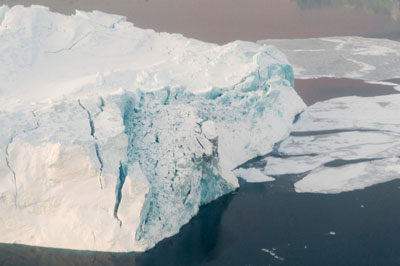
31 March 2014 - A new UN report has warned that most of the World is not yet prepared for the impacts of climate change that are already taking place on a global scale. The report titled Climate Change 2014: Impacts, Adaptation and Vulnerability from the 2nd Working Group of the Intergovernmental Panel on Climate Change (IPCC) details the impacts of climate change to date, the future risks from a changing climate and the opportunities for effective risk reduction. The UN Secretary-General Ban Ki-moon said the report confirms the effects of human caused climate change are already widespread and consequential, affecting agriculture, human health, ecosystems on land and in the oceans, water supplies and some industries.
>> Full UN press release
UNESCO Director-General signs agreement on International Centre for Water Cooperation
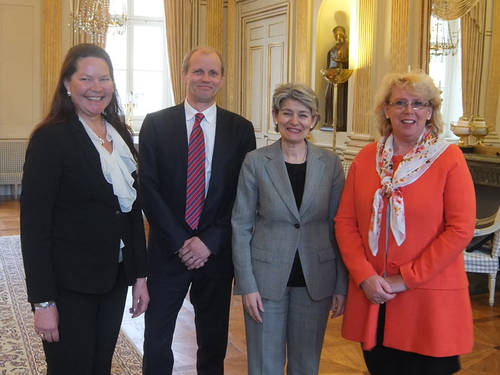
25 March 2014 - The UNESCO Director-General Irina Bokova signed in Stockholm, Sweden, an agreement between UNESCO, the Government of Sweden and the Stockholm International Water Institute to make the International Centre for Water Cooperation in Sweden a Category 2 Centre. The Centre will support UNESCO's objectives by developing knowledge for cooperation in sustainable management of transboundary waters and build capacities through research and training. It will also play a vital role in the Potential Conflict to Cooperation Potential (PCCP) programme as well as the related work of the International Hydrological Programme (IHP) and the World Water Assessment Programme (WWAP).
>> More information
57 UN Permanent Representatives sign a document urging for a dedicated Water and Sanitation Sustainable Development Goal

22 March 2014 - On the occasion of World Water Day 2014, a campaign to collect signatures from UN Permanent Representatives has been circulated, encouraging all Member States to support the elaboration and adoption of a dedicated Sustainable Development Goal (SDG) on water and sanitation in the post-2015 development agenda. With water challenges increasing, hindering future development and threatening current advances, the campaign states "complacency is not an option, a committed and forceful response is urgently needed". The water and sanitation SDG would need to be ambitious, taking into account the unfinished business of the Millennium Development Goals (MDGs) as well as future challenges. Documents from the Co-Chairs of the 9th session of the Open Working Group (OWG) on Sustainable Development Goals, which took place on 3-5 March 2014, will be used as a basis to help shape the SDG.
>> Progress report from the 9th Session OWG on Sustainable Development Goals
United Nations report warns rising energy demand will stress fresh water resources
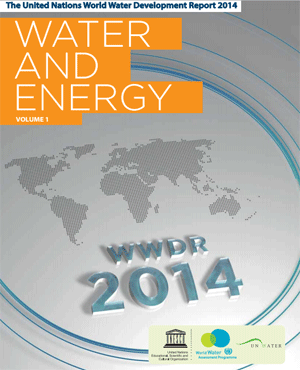
21 March 2014 - The world's freshwater resources will suffer from efforts to meet the growing global demand for energy, concludes the 2014 United Nations World Water Development Report (WWDR). Launched in Tokyo on 21 March, the report critically reviews the lack of coordination and planning between the two domains and urges improved management and planning at all levels to avoid shortages in energy and water supplies, and the further deterioration of natural resources. "The 2014 World Water Development Report shines light on the interdependence between the management of water and energy," said Irina Bokova, Director-General of UNESCO "This interdependence calls for vastly improved cooperation between these sectors because there will be no sustainable development without better access to water and energy for all," she added.
>> Access WWDR2014
2014 edition of UN Water 'Water for Life' Awards goes to India and Singapore!
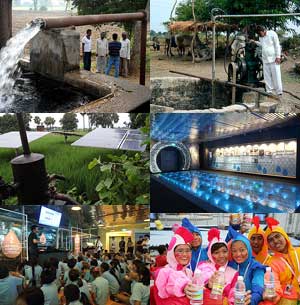
21 March 2014 - The 'Water for Life' UN-Water Best Practices Award intends to promote efforts to fulfil international commitments made on water-related issues by 2015 through recognition of outstanding best practices which can ensure the long-term sustainable management of water resources and contribute to the achievement of internationally agreed goals and targets.
The 2014 edition, which focuses on 'Water and Energy', has been awarded on 21 March during the official UN ceremony of World Water Day 2014 taking place at UNU Headquarters, Tokyo, Japan. Category 1 'Best water management practices' has been awarded to a project focusing on policy research in co-management of energy and groundwater in India: The International Water Management Institute (IWMI)-Tata Water Policy Programme (ITP). Category 2 'Best participatory, communication, awareness-raising and education practices' has been awarded to a project focusing on wide-scale implementation and public engagement plan of reclaimed water in Singapore: the 'NEWater programme'.
>> Full press release
>> More information on the Award and finalists
UN expert urges long-term, rights-based approach to water crisis in Jordan
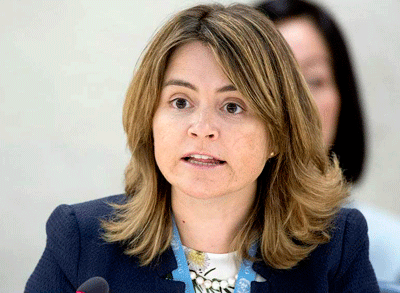
17 March 2014 - Following a six day mission in Jordan, the United Nations Special Rapporteur on the human right to safe drinking water and sanitation, Catarina de Albuquerque, has stated that "Jordan is at a critical moment, the existing emergency measures to the water scarcity problem are not sufficient or sustainable". Jordan is one of the three most water scarce countries in the world. The severe water scarcity has been exacerbated by drought, depletion of groundwater reserves, population growth, inflow of migrant workers and climate change. This combined with several waves of refugees resulting from conflicts in the region, the latest from Syria, has increased these pressures. The Special Rapporteur will present a formal report on this mission to an upcoming session of the UN Human Rights Council in September.
>> Full UN News press release
>> Read the end of mission statement by the Special Rapporteur
Apply to the 2nd edition of the online course on International Water Law
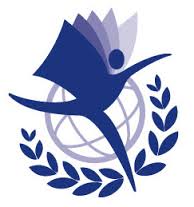
17 March 2014 - The United Nations Institute for Training and Research (UNITAR) and the University of Geneva through the platform for International Water Law are opening the 2nd edition of their online course, which will take place between 2 June and 4 July 2014. The course aims to provide professionals involved in negotiating or implementing treaties on or related to freshwater resources with an advanced knowledge of the principles and norms that govern the use, sharing, management and protection of water resources. Deadline for application is 11 May 2014.
>> More information
Free online course offers supported learning on Household Water Treatment and Safe Storage

13 March 2014 - The World Health Organisation (WHO) Collaborating Centre has launched a series of online courses on water and sanitation. The Massive Open Online Course (MOOC) series has been created in collaboration with the Swiss University EPFL. The first installment 'Introduction to Household Water Treatment and Safe Storage (HWTS)' begins 7 April 2014 and will run for 5 weeks. The course, which requires only 6–8 hours per week, will start by looking at the global burden of disease from unsafe drinking water; water contamination – microbial, chemical, physical aspects of water quality; how does drinking water become unsafe?; what is HWTS?; how does HWTS fit in with MDGs and whatever will follow them? In the following weeks, these aspects will be explored more deeply through treatment options, implementation strategies and assessing the impact of HWTS. The course is free of charge and simply requires an internet connection and an interest in drinking water quality. Sign up today!
>> Register for the course
20th edition of Bimonthly Publications Review is online!
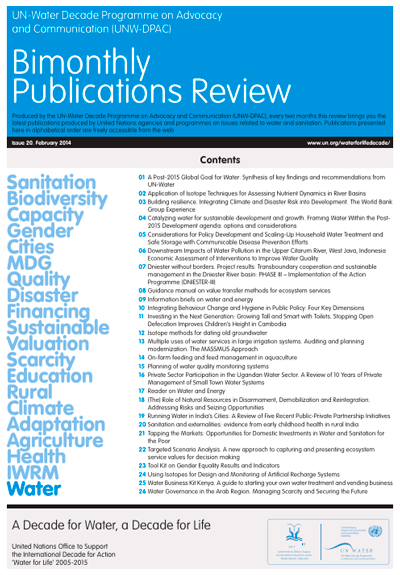
6 March 2014 - Every two months, the UNW-DPAC Bimonthly Publications Review brings you the latest publications produced by United Nations agencies and programmes on issues related to water and sanitation. The 20th edition contains 26 publications on a variety of topics including: the Post-2015 process, river basin case studies, guidance manuals, information briefs, tool kits and many more. For useful technical, research or media reference download the bi-monthly now and access the electronic version of these publications from the UN-Documentation Centre on Water and Sanitation.
>> Bimonthly publications review 20
Energy production and water supply interdependent, and both at risk, shows new UN report
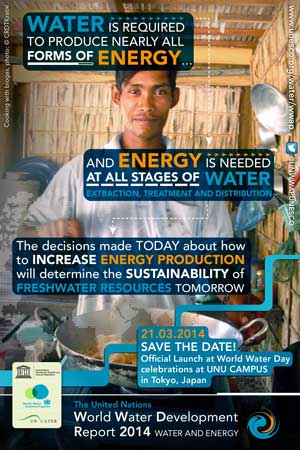 3 March 2014 - Demand for energy production will increase significantly in coming decades, especially in emerging economies. This may have a negative impact on water resources unless the management and coordination between both domains is dramatically improved. This is one of the key findings of the United Nations World Water Development Report 2014 (WWDR), which will be launched in Tokyo (Japan) on 21 March, World Water Day. The Report is under embargo until 21 March. Advance access is available to the media on demand.
3 March 2014 - Demand for energy production will increase significantly in coming decades, especially in emerging economies. This may have a negative impact on water resources unless the management and coordination between both domains is dramatically improved. This is one of the key findings of the United Nations World Water Development Report 2014 (WWDR), which will be launched in Tokyo (Japan) on 21 March, World Water Day. The Report is under embargo until 21 March. Advance access is available to the media on demand.
>> More information
2015 UN-Water Annual International Zaragoza Conference will focus on Water and Sustainable Development: from Vision to Action

25 February 2014 - The post-2015 agenda for water will be decided upon in 2015! The 2015 UN-Water International Zaragoza will kick off the year discussing the agenda ahead and its implementation. In preparation for World Water Day 2015, which will focus on 'water and sustainable development,' more than 300 participants from UN agencies and programmes, experts, representatives from business communities, governmental and non-governmental organizations will meet to discuss the steps towards a sustainable post-2015 agenda. The Conference will deal with some of the main implementation challenges related to the five main targets recommended by the UN-Water synthesis document on a Global Goal for Water "Securing Sustainable Water for All"
>> Download the Conference leaflet
African Ministerial Conference on Green Economy told valuation of ecosystem critical to Africa's growth by UN Environment Programme
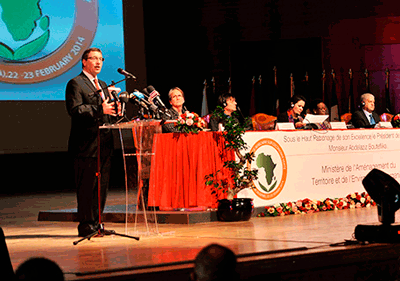
23 February 2014 - During the African Ministerial Conference on Green Economy which took place from 22 to 23 February in Oran, Algeria, Executive Director of the UN Environment Programme (UNEP), Achim Steiner, told regional leaders of the need to place value on natural resources. Mr Steiner said "An inclusive green economy has the potential to improve human well-being and social equity, while significantly reducing environmental risks and ecological scarcities." The conference intended to involve the international community in forming a new Post-2015 development agenda to succeed the eight Millennium Development Goals (MDGs).
>> Read Achim Steiners full address
>> UN News press release
UN-Water technical advice on a Global Goal for Water delivered at side event during UN General Assembly thematic debate
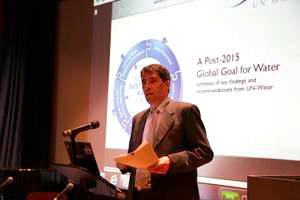
20 February 2014 - The UN-Water side event organized during the UN General Assembly thematic debate on Water, Sanitation and Sustainable Energy in the Post-2015 Development Agenda presented the results of a year-long expert consultation among UN-Water’s 31 UN system Members and 36 international partners. The synthesis report suggested a global goal with five measurable and interlinked targets and was well received by participants, including Member States.
>> Summary of side event
>> Download synthesis of key findings and recommendations for a post-2015 global goal for water
Water scarcity among critical food security issues in Near East and North Africa
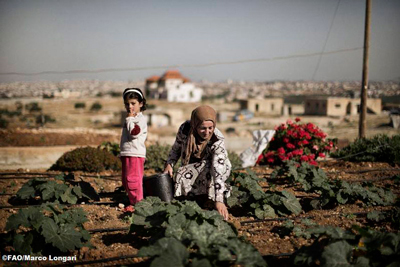
20 February 2014 - The United Nations Food and Agriculture Organization (FAO) has warned that water scarcity is one of the most urgent food security issues facing countries of the Near East and North Africa, with freshwater availability in the region expected to drop by 50 per cent by 2050. FAO’s warning comes as ministers of agriculture and national officials prepare to tackle the issue at a meeting of the organization’s highest regional governing body beginning next Monday.
>> Full press release
UN General Assembly thematic debate on Water, Sanitation and Sustainable Energy in the Post-2015 Development Agenda concludes calling for ambitious Sustainable Development Goals on water and energy
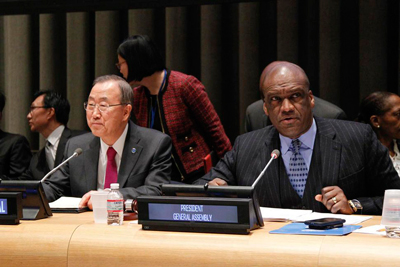
19 February 2014 - United Nations officials warned of the importance of the water, sanitation and sustainable energy crises amidst the World’s imminent development challenges during the UN General Assembly debate that urged Member States to initiate integrated policies and innovative strategies in response to these issues. The Secretary General Ban Ki-Moon emphasized the importance of access to safe drinking water, sanitation and hygiene stating that they “must feature prominently in the post-2015 development agenda.” In addition, the effects of climate change on the water, sanitation and energy nexus were brought into question, in response the UN Secretary General intends to convene a climate Summit on 23 September for global leaders.
>> More information
>> Statements by country representatives and UN Deputy Secretary-General
>> Video recording of Opening segment and Panel 1 "The water and sanitation challenge"
>> Video recording of Panel 2 "The sustainable energy challenge"
>> Video recording of Panel 3 "The water-energy nexus"
Call for papers for the 11th Annual Meeting of the International Water Resource Economics Consortium (IWREC): deadline is 28 February
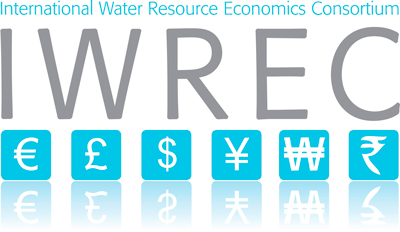
17 February 2014 - In preparation for the IWREC meeting, 7-9 September 2014, to be hosted by the World Bank in Washington DC under the theme “Efficiency and Water Conservation: Methodologies and Case Studies” the organizers are accepting papers until 28 February. Papers submitted must be within the following topics: Water and economic growth, residential water efficiency and conservation, integration of water for energy and energy for water, agricultural water productivity versus efficiency and conservation, water reuse and recycling, climate change and efficiency of water supply and use.
>> More information
Thematic paper for debate of the UN General Assembly “Water, Sanitation and Sustainable Energy in the post-2015 development agenda” released
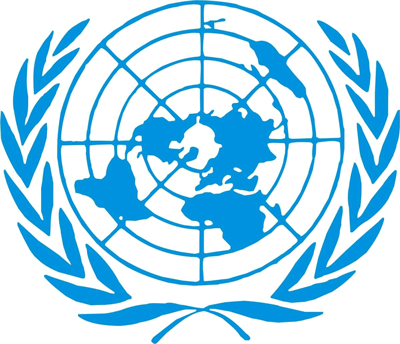
17 February 2014 - In preparation for the thematic debate that took place at the UN Headquarters, New York, on 18-19 February 2014, a paper detailing the discussions that took place, their proposed outcomes and suggested questions was released. The debate had a look at Water, Sanitation and Sustainable Energy individually in three roundtable events as well as their inter-linkages. It also discussed how the challenges they propose will be approached through the Post-2015 development agenda. The thematic paper provided each roundtable event with a list of suggested questions to inspire debate as well as a summary of the points to be covered.
>> Thematic paper
UN-Water presents a synthesis of key findings and recommendations for a post-2015 global goal for water
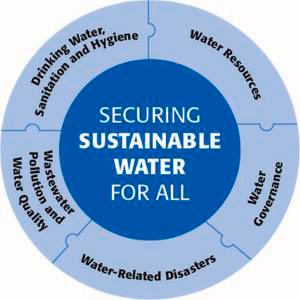
5 February 2014 - UN-Water has presented a paper summarizing key findings and recommendations for a post-2015 global goal for water. The paper, which was approved at the UN-Water meeting on 27 January 2014, is the result of a broad technical consultation process among UN-Water members and partners, as well as a range of other stakeholders and aims to inform, provide advice and recommendations in support to Member States in their decision-making process on the post-2015 development agenda. It proposes a set of potential targets and indicators to support a dedicated global goal for water and contributes towards the Sustainable Development Goals (SDG) consultation process.
>> Download and share the paper
Participate in WWD Photo competition! Deadline is 28 February
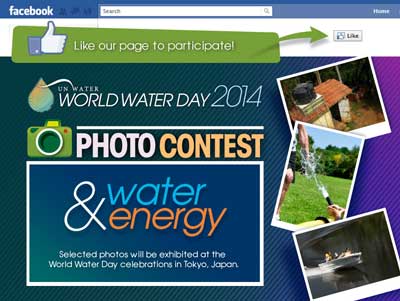
4 February 2014 - How would you best illustrate the challenges of water and energy? In preparation for World Water Day 2014 (WWD2014), a photo competition is being held to provide a visual platform for the discussions. Participate, and not only win the chance to have your photo displayed during the World Water Day celebrations 20-21 March, Tokyo, Japan, but also help create a visual impact for an issue that affects us all. If you have an eye for an image and want to aid a global issue, get snapping!
>> Submission guidelines
>> Participate through Facebook
‘Code for Resilience Hackathon’ launches a call to help reduce disaster risk in Asia
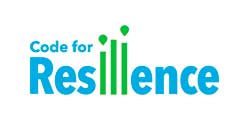
4 February 2014 - A ‘hackathon’ is an event in which innovative software and hardware designers approach disaster risk challenges by working on ‘hacks’ using open source software applications, or developing new tools, such as rain gauges outfitted with remote sensing devices. Code for Resilience, a collaborative World Bank initiative, is working with local partners and organizing hackathons in cities across Asia, where high population density and rapid urbanization make communities vulnerable to the impact of natural disasters. Get involved and contribute with your project or sign up for local hackathons events!.
>> Code for Resilience website
Launch of 1st e-discussion on realizing the rights to water and sanitation

29 January 2014 - The UN Special Rapporteur on the human right to safe drinking water and sanitation, Catarina de Albuquerque, launches a round of e-discussions on the Handbook for realizing the rights to water and sanitation. The discussions aim to identify the key barriers, challenges and opportunities that stakeholders encounter in realizing the rights to water and sanitation. This first discussion, which runs from 29 January to 10 February 2014, focuses on general experiences in supporting access to water and sanitation including some of the main challenges of discrimination in service delivery in realizing the rights to water and sanitation. This is an important opportunity to share experiences, good practices and lessons learned on ensuring non-discrimination and equality in ensuring access to water and sanitation, so be sure to participate.
>> Participate in or follow the discussion
Save the date! World Water Development Report 2014 (WWDR2014) on Water and Energy to be launched on 21 March 2014

28 January 2014 – Water is required to produce nearly all forms of energy and energy is needed at all states of water production. WWDR2014, to be launched during the main World Water Day celebrations in Tokyo, Japan, on 21 March 2014, describes the water-energy interlinkages, constraints, challenges, impacts and opportunities. The report also provides examples of actions and responses that can provide mutually beneficial outcomes and the most recent data on current projected growth in the demand for water and energy.
>> Download Save the Date! card and help promote the message!
>> Visit the WWDR2014 dedicated section
UN-backed website aims to aid ‘Green’-Minded Governments
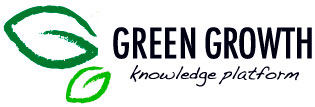
22 January 2014 – As the international community lays the groundwork for sustainable development goals after 2015, the United Nations environment agency today backed a new website that compiles hundreds of technical and policy resources to help decision-makers transition to green economic growth. "The Green Growth Knowledge Platform provides a much needed tool to bridge knowledge gaps, exchange information and deliver policy guidance to accelerate and support the transition towards green economic development," said Achim Steiner, Executive Director of the UN Environment Programme (UNEP). The website features a searchable e-library with over 600 technical and policy resources, as well as dashboards with data and policies for 193 countries.
>> Access Green Growth Knowledge Platform
UN-Water Journalist Workshop on Water and Energy: Apply by 10 February 2014!

21 January 2014 – World Water Day, celebrated annually on 22 March, is this year dedicated to the theme ‘Water and Energy’. On this occasion, UN-Water is organizing a media workshop aimed at improving journalists’ understanding of water-energy issues and giving a voice to the challenges the world faces. If you feel you have the passion and ability to report and help spread awareness of the water and energy issues that impact us all, please submit your application for the World Water Day Media Workshop. Taking place on 20-21 March 2014 in Tokyo, Japan, journalists will receive media and editorial training in water and energy issues and meet and interview experts participating in World Water Day 2014. Some grants are available to journalists from the Asian region.
>> Information on how to apply
World Bank releases new ‘Thirsty Energy’ infographics
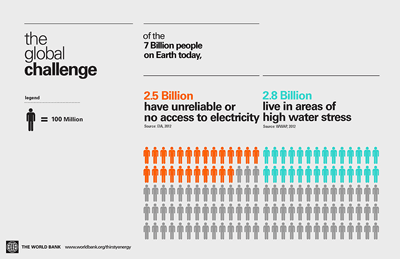
21 January 2014 – The World Bank has released a set of infographics which demonstrate the energy and water’s interdependencies. The infographics aim to demonstrate some of the facts surrounding the water-energy challenge and hopefully take this information to those that may not be aware of it. The data maps the journey of the water-energy nexus as far as 2050, exploring the global effects of increased demand, how this will impact vulnerable, developing countries, risks for the energy sector and where and how it is already happening.
>> Download the ‘Thirsty Energy’ infographics
The UN Special Rapporteur on the right to safe drinking water and sanitation looks forward to your feedback for a Handbook on realizing the rights to water and sanitation

20 January 2014 – The UN Special Rapporteur on the human right to safe drinking water and sanitation, Ms Catarina de Albuquerque, has opened consultation sessions for the handbook on realizing the rights to water and sanitation. Ms. de Albuquerque says it will "provide practical guidance to governments and other actors" and has been arranged according to five areas of practice "legislative, policy and regulatory frameworks, financing and budgeting, service delivery, awareness-raising and accountability." The first consultation session, Chapter 1.1 "Incorporating the rights to water and sanitation into legislative, regulatory and policy frameworks" began on 17 January. You are invited to read and contribute to each chapter.
>> Participate in the consultation!
The UN-Water conference in preparation for World Water Day concludes: Cooperation between water and energy and with Governments recognized as vital to securing services required in the near future
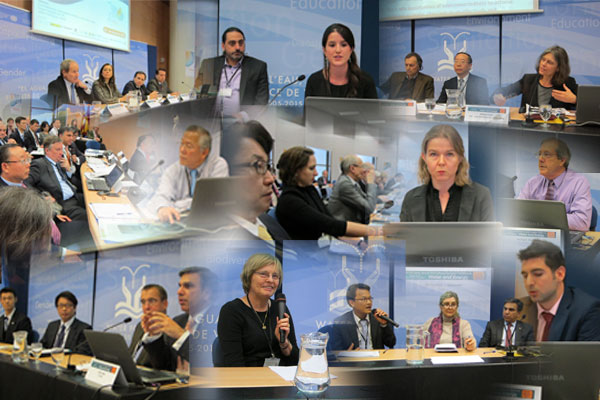
2 billion more people will need access to water and energy by 2050.
16 January 2014. – World Water Day, which is celebrated annually on 22 March, is this year dedicated to the theme ‘Water and Energy.’ In preparation for the event, 9 UN agencies and programmes plus more than 120 experts, representatives of international companies in the water and energy sector, government and non-governmental organizations met from 13 to 16 January in Zaragoza, Spain, to address the challenges, relationships and joint solutions that arise in ensuring access, efficiency and sustainability in the provision of water and energy.
Presentations, recordings of sessions and different information materials on water and energy are available on the Conference website.
>> Conference website
>> Press release summarizing main conclusions, 16 January 2014
>> Water for Life Voices campaign
>> Submit your voice!
>> Your #WaterForLifeVoices on Flickr
![]() Flickr
Flickr
![]() Slideshare
Slideshare
![]() Twitter
Twitter
![]() YouTube
YouTube

>> Outcome Document from OWG on Sustainable Development Goals
>> A Post-2015 Global Goal for Water: Synthesis of key findings and recommendations from UN-Water 
>> Post 2015 Water Thematic Consultation Report
>> Report of the High-Level Panel of Eminent Persons on the Post-2015 Development Agenda
>> UN-Water section on water in the post-2015 process
>> UN post-2015 agenda
>> DESA section on Post-2015
>> JMP Post-2015 global monitoring
>> Sustainable Development Goals e-Inventory
>> Summary of Stock taking meeting of Intergovernmental Negotiations on the Post-2015 Development Agenda
>> Synthesis Report of the Secretary-General on the Post-2015 Agenda
>> Decade's weekly
The Decade's weekly brings you every week the latest news from the Decade.
>> Bimonthly Publications Review 25, 26 and 27 [ - 546 Kb]
- 546 Kb]
UNW-DPAC. May 2015
>> Previous issues
Sustainable Development
15-17 January 2015: UN-Water International Zaragoza Conference ‘Water and Sustainable Development: From vision to action’
22 March 2015: World Water Day on Water and Sustainable Development
Biodiversity
2011-2020: UN Decade on Biodiversity
Deserts and Desertification
2010-2020: UN Decade for Deserts and the Fight Against Desertification
Energy
2014-2024: Decade on Sustainable Energy for All
22 March 2014: World Water Day on 'Water and Energy'
Sanitation
2011-2015: Sustainable sanitation: The Five-Year-Drive to 2015
19 November 2014: World Toilet Day
Copyright | Terms of use | Privacy notice | Site Index | Fraud alert | Help







